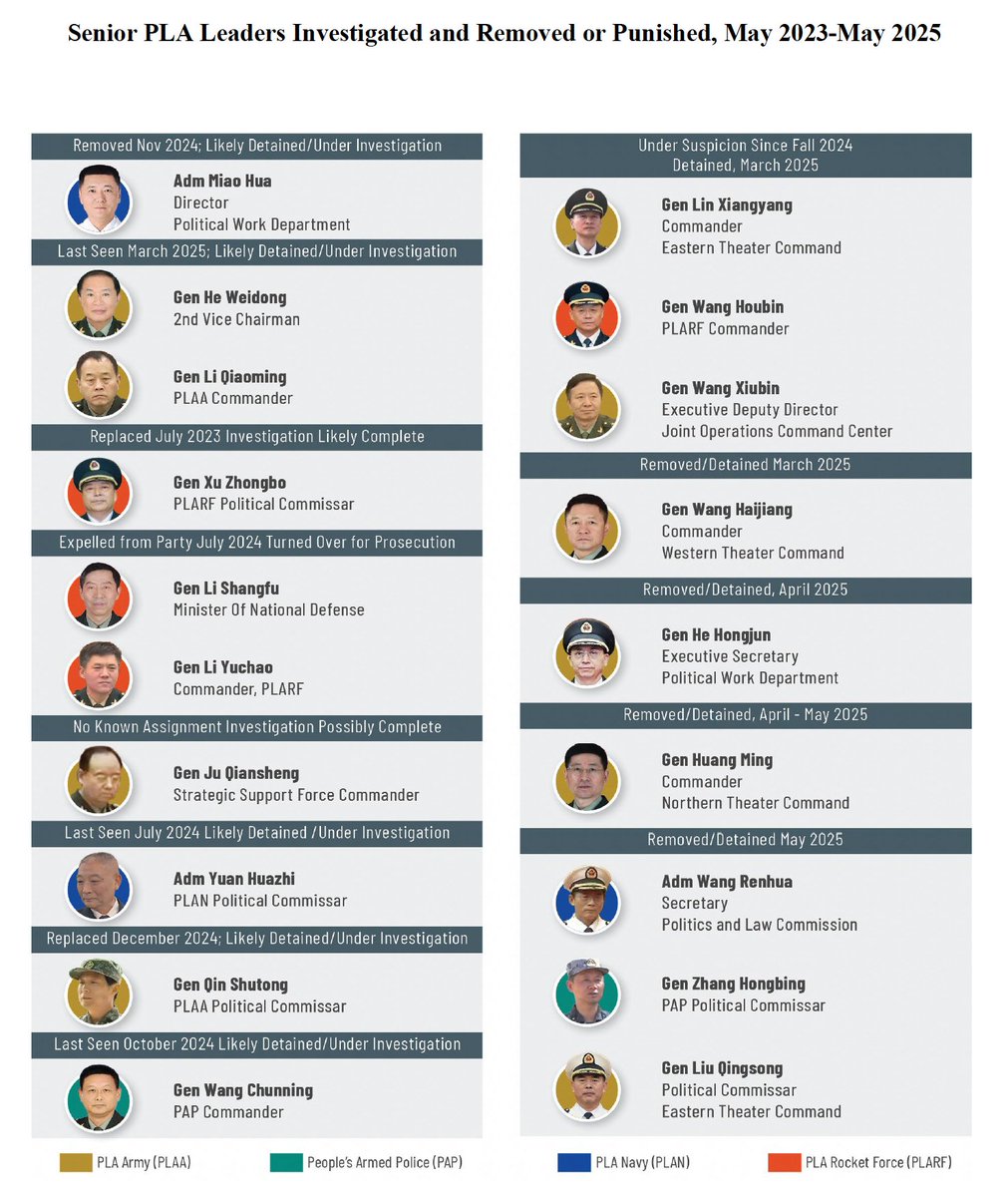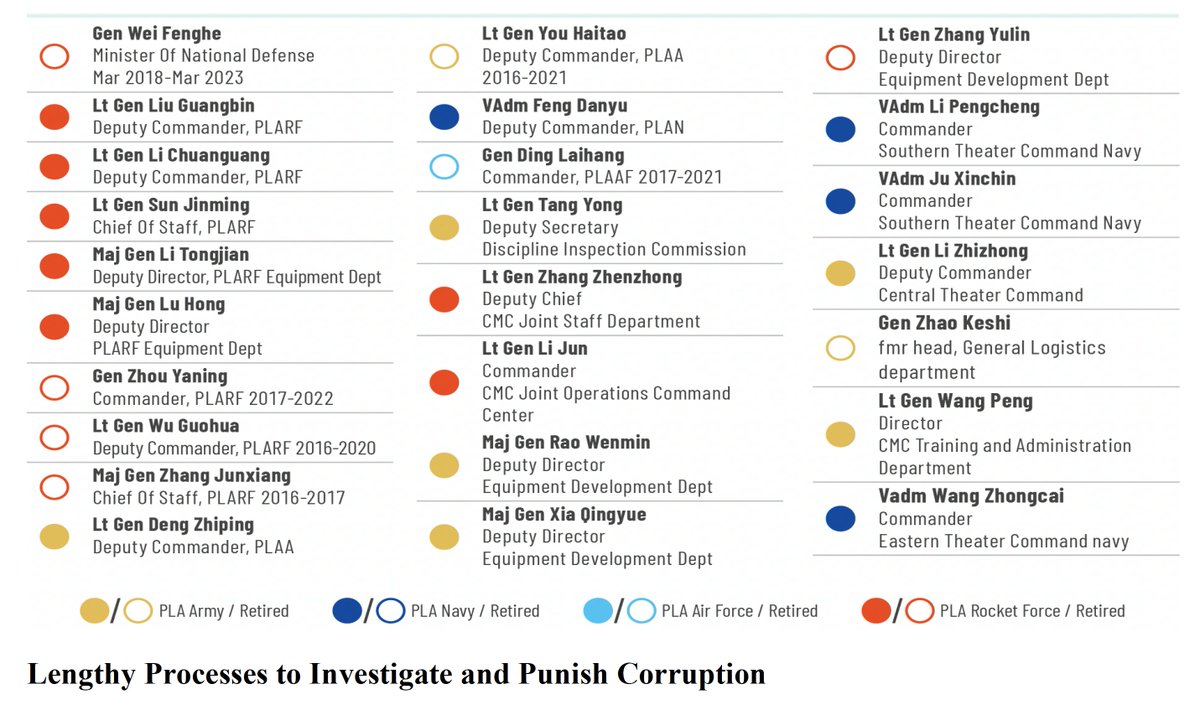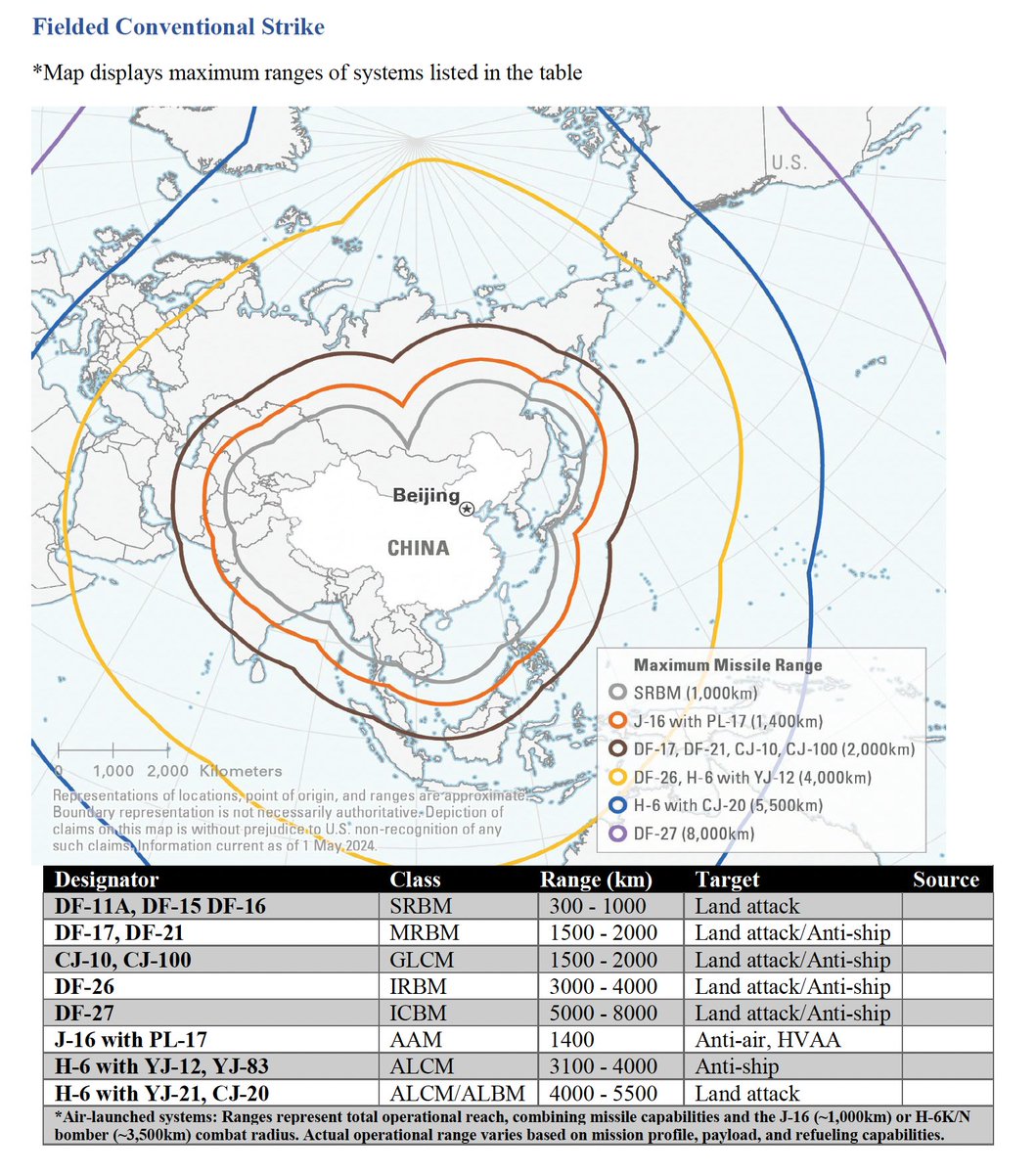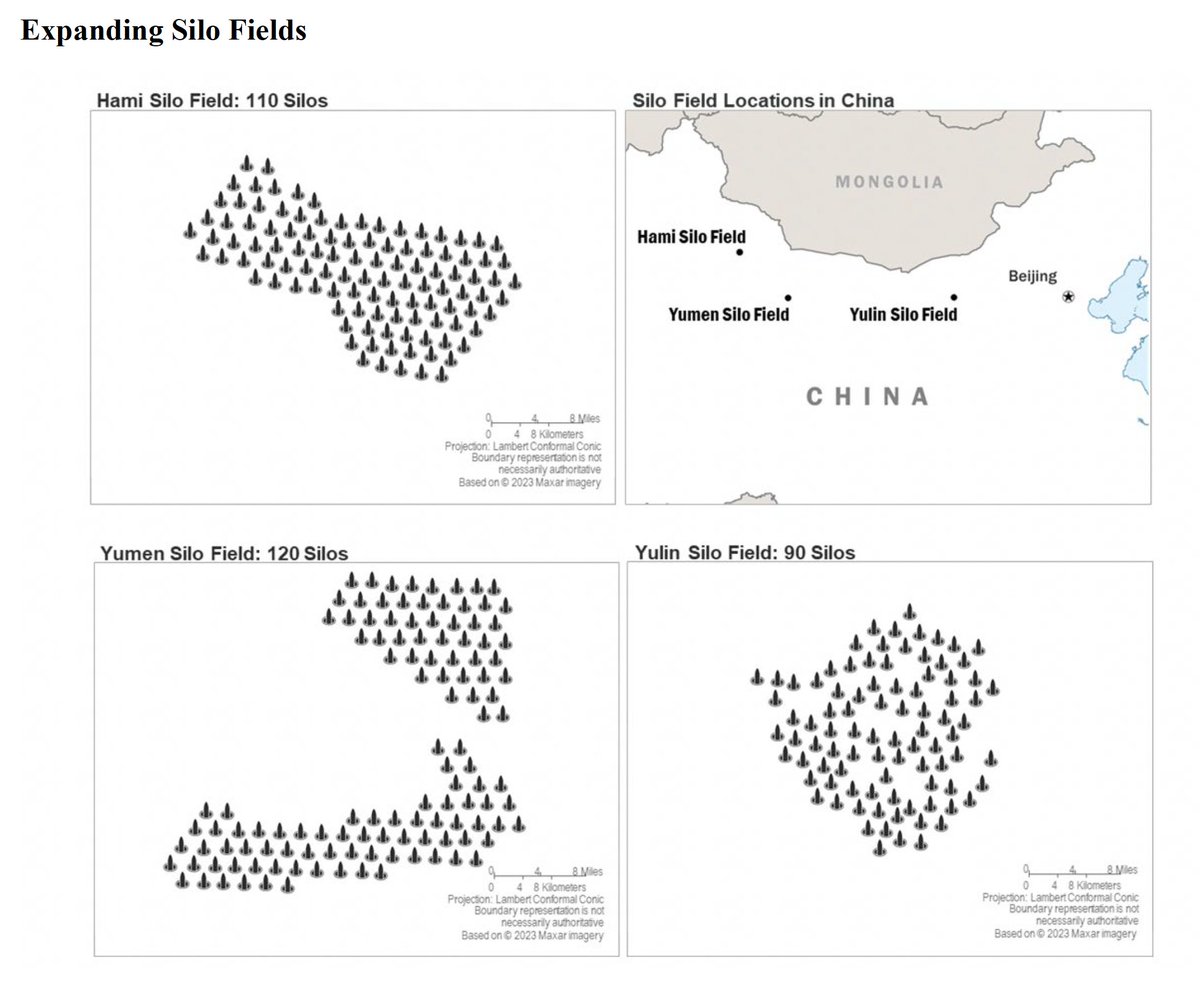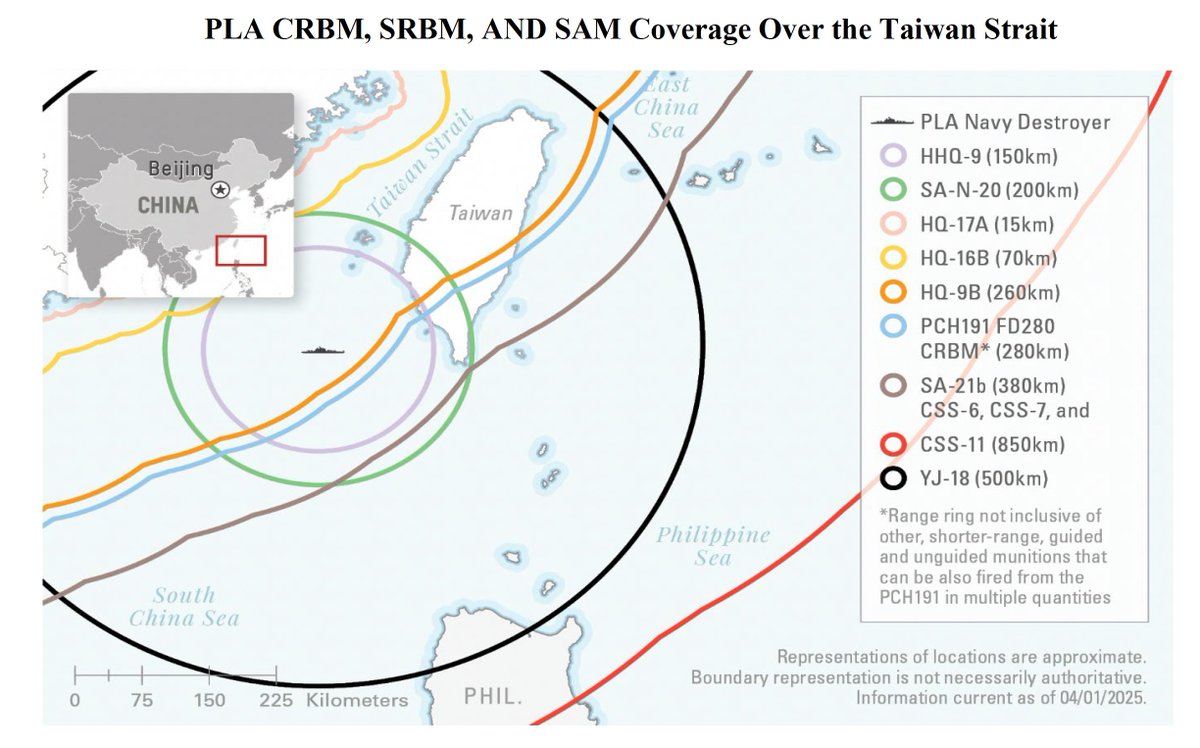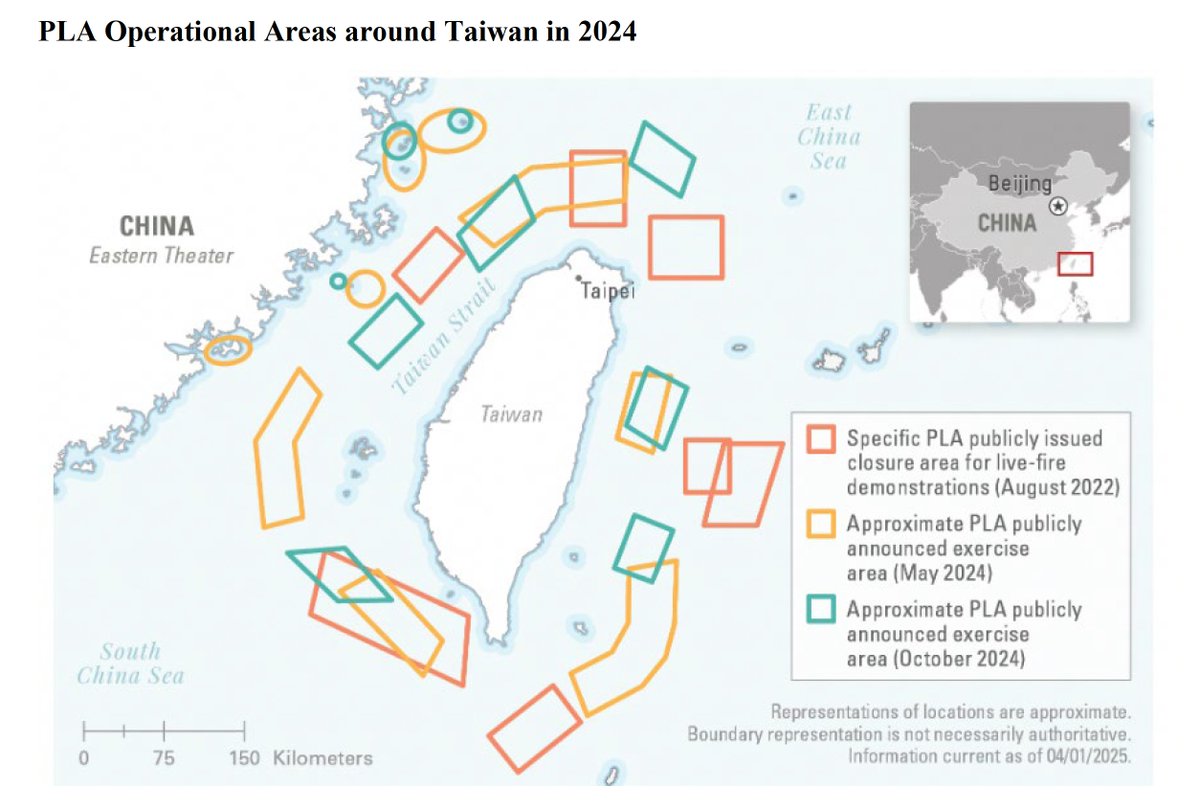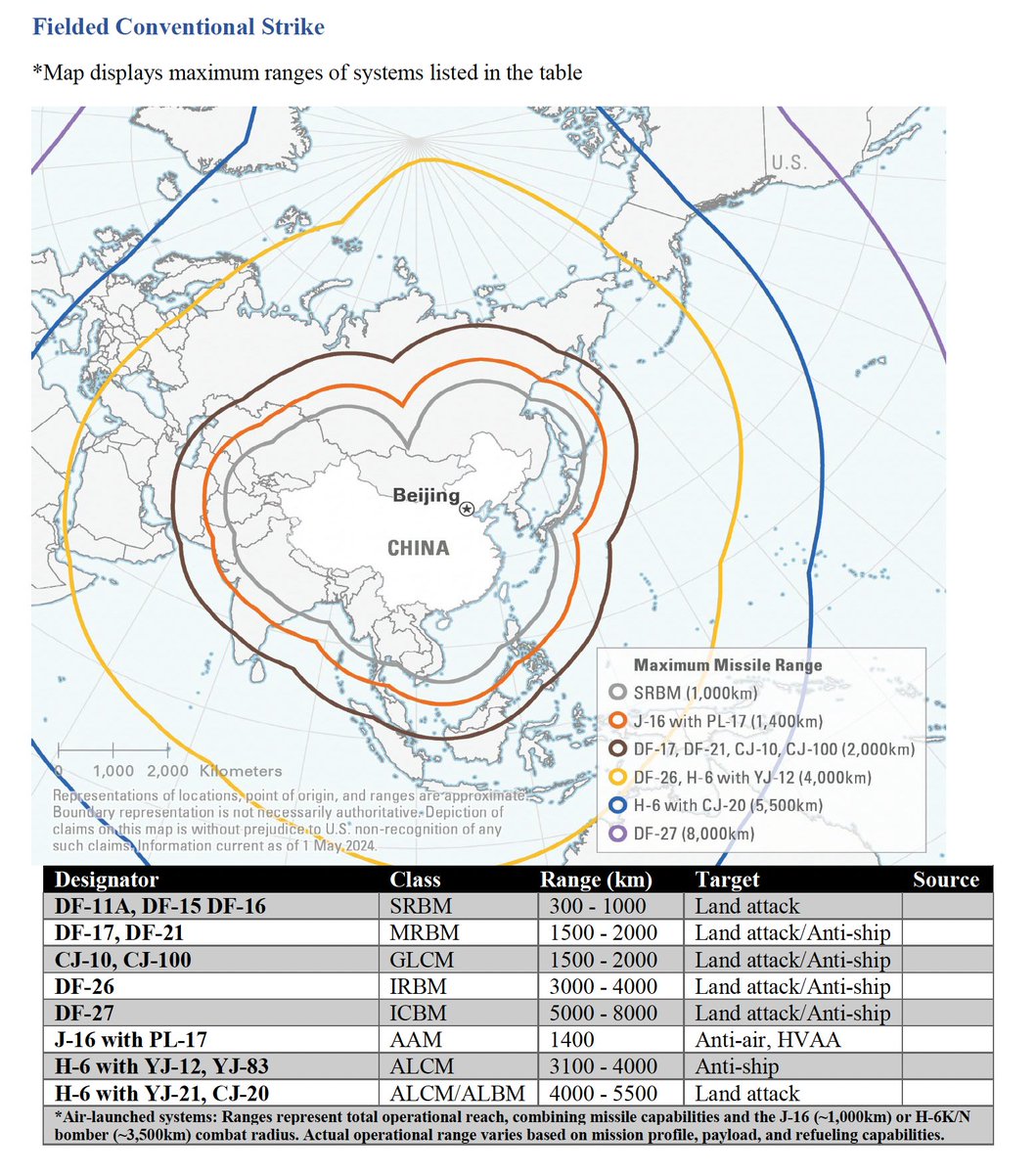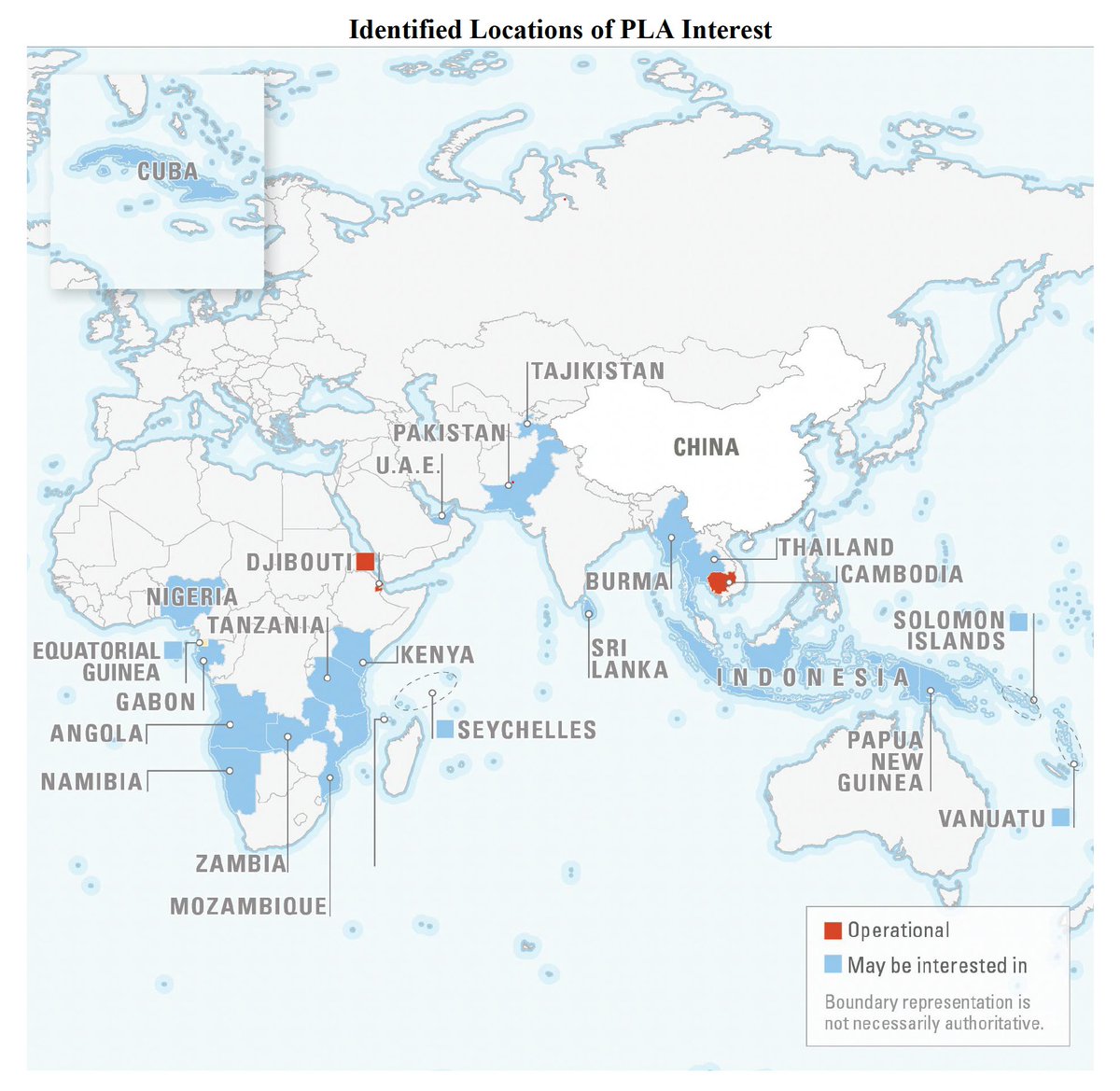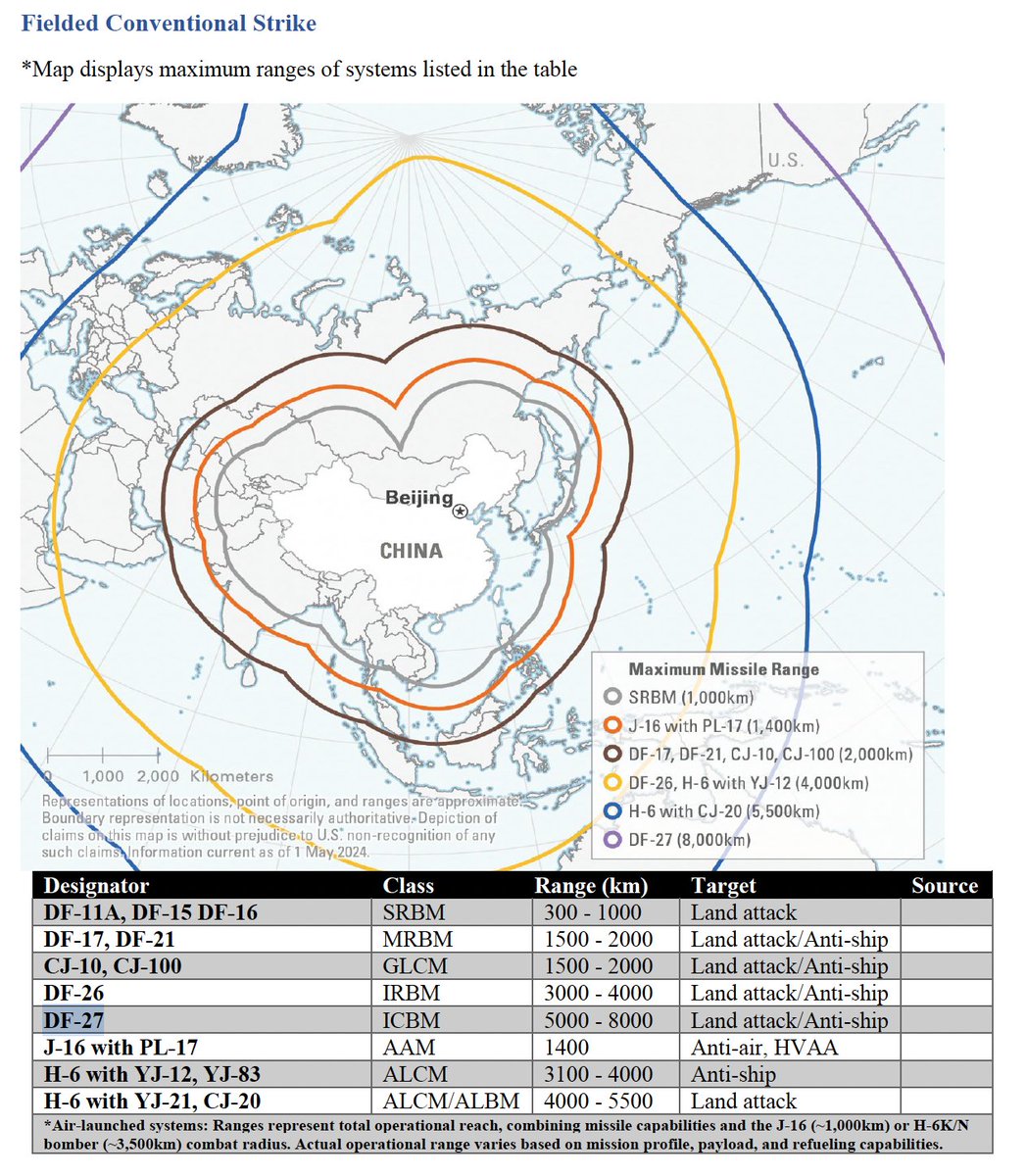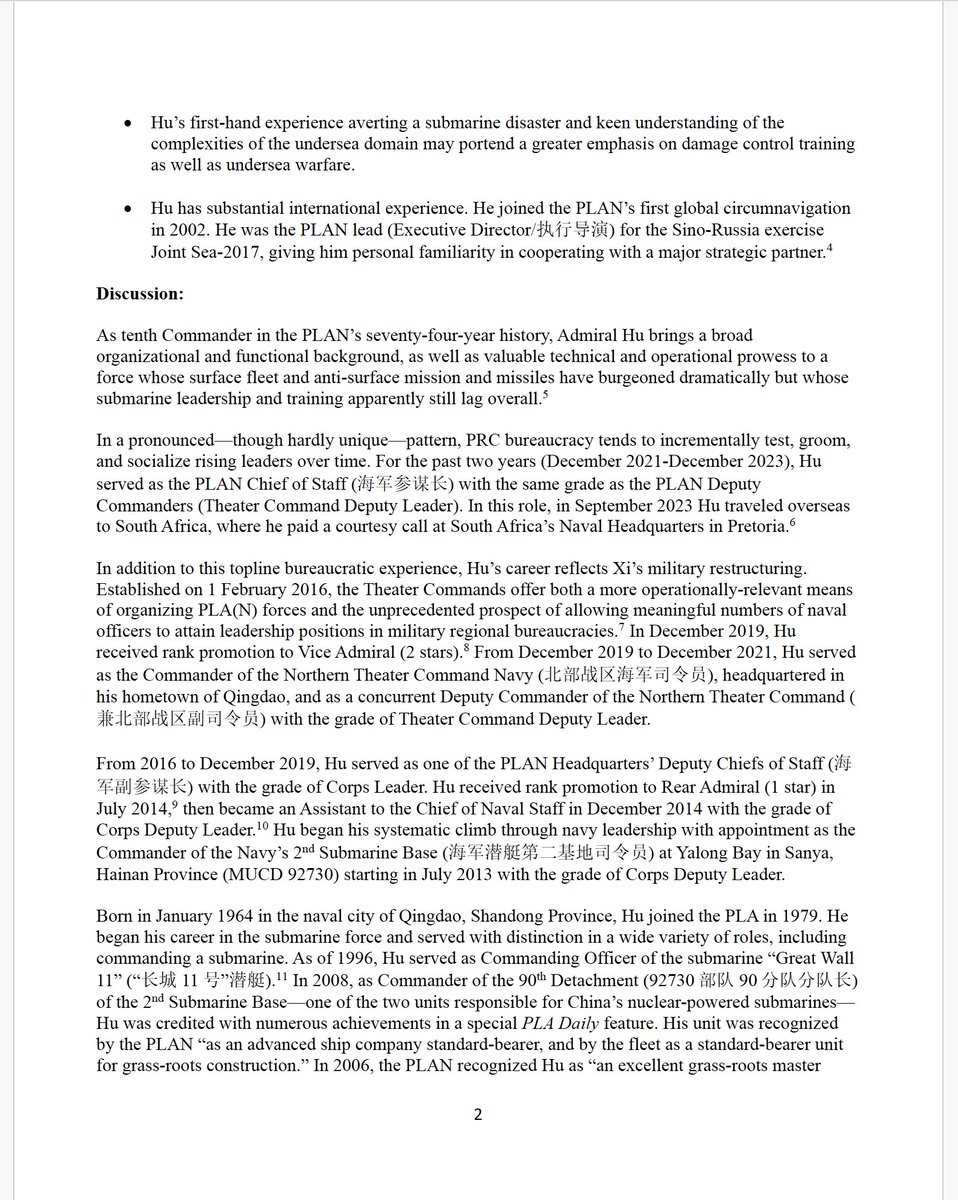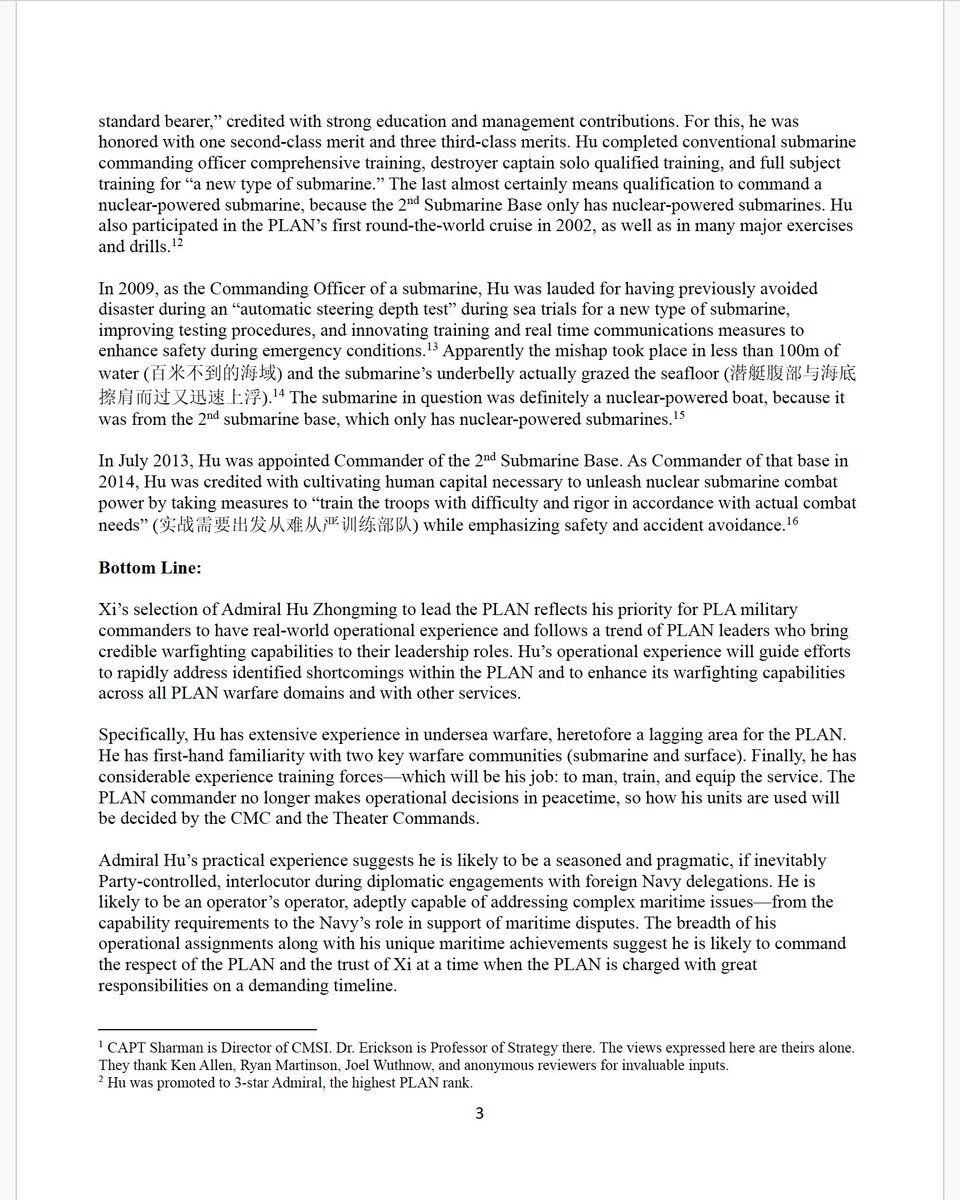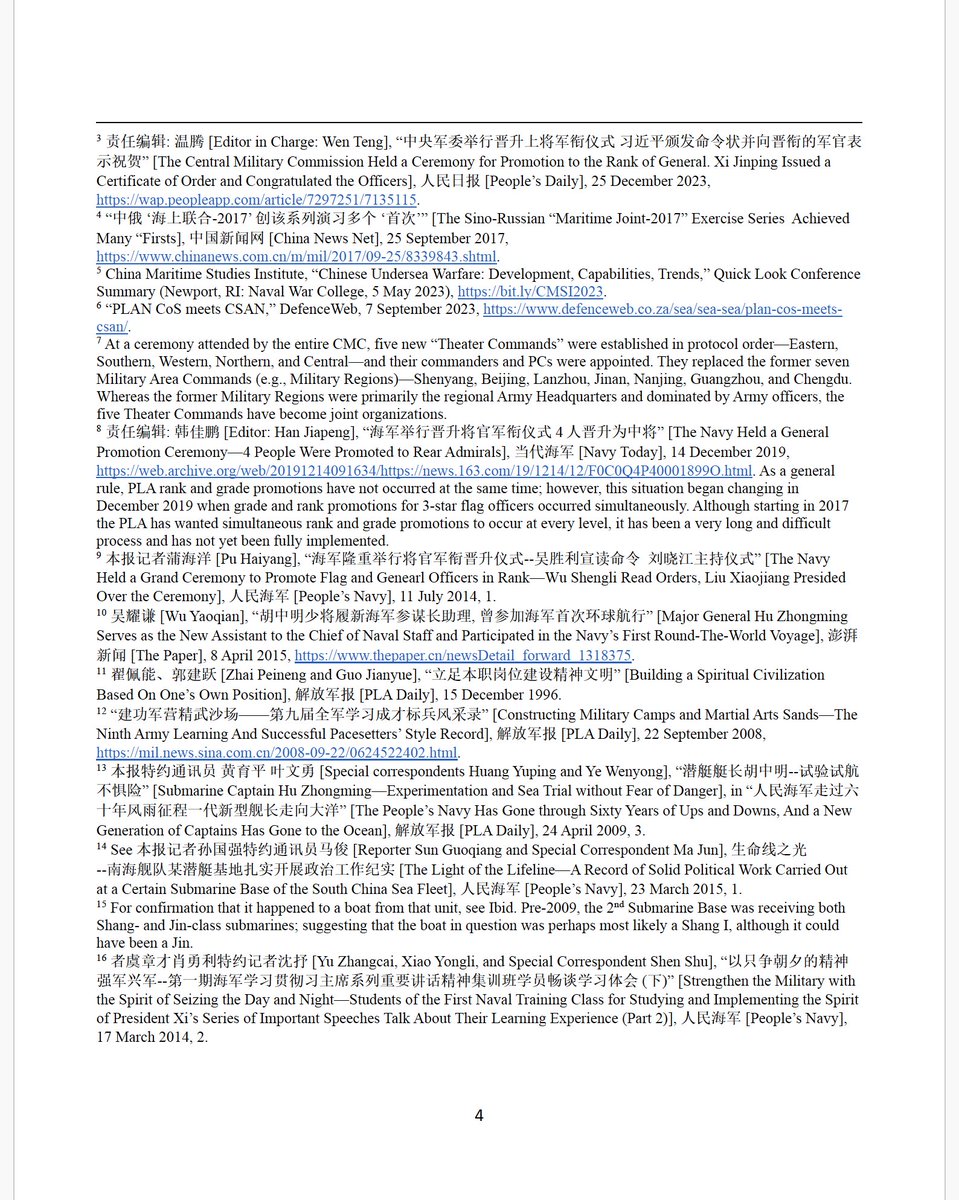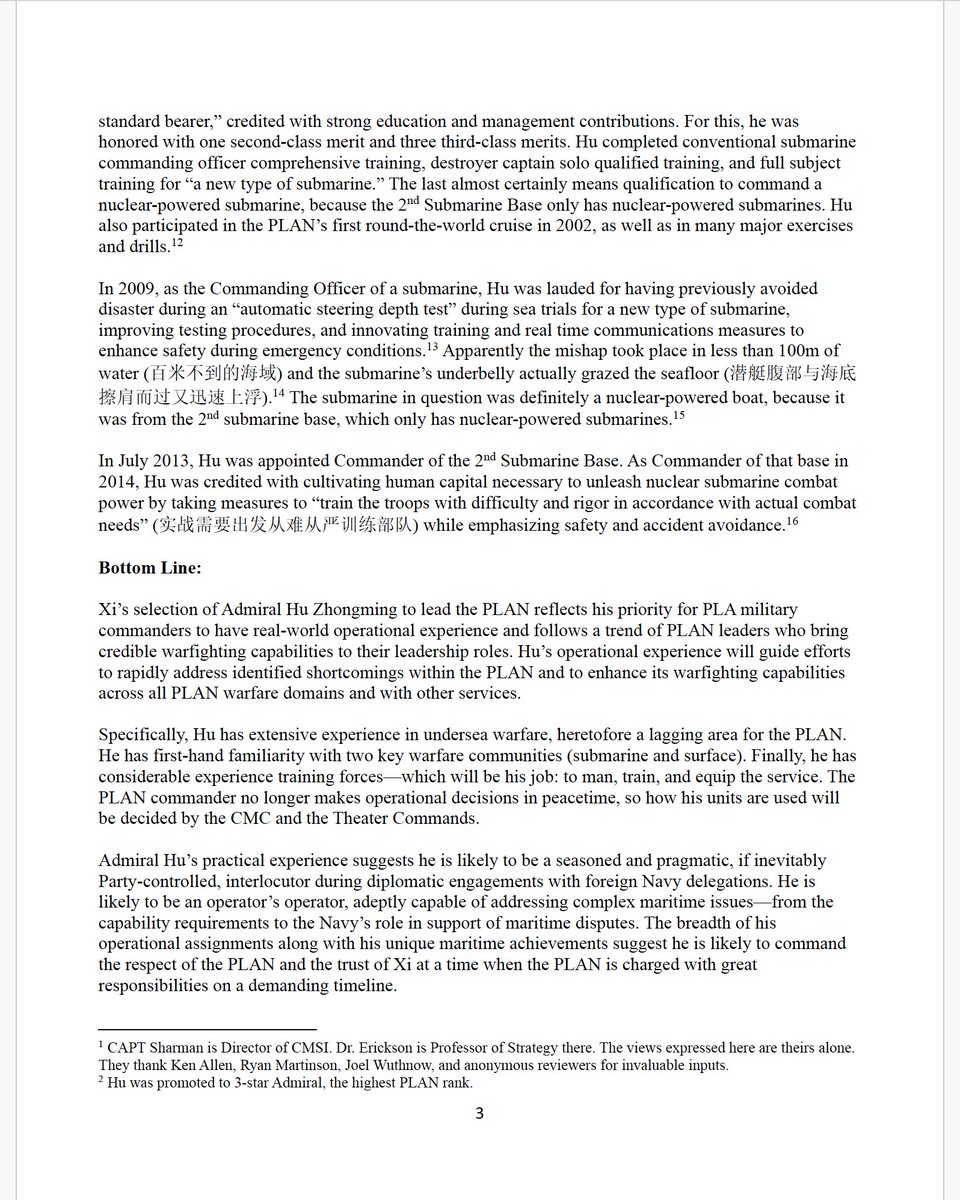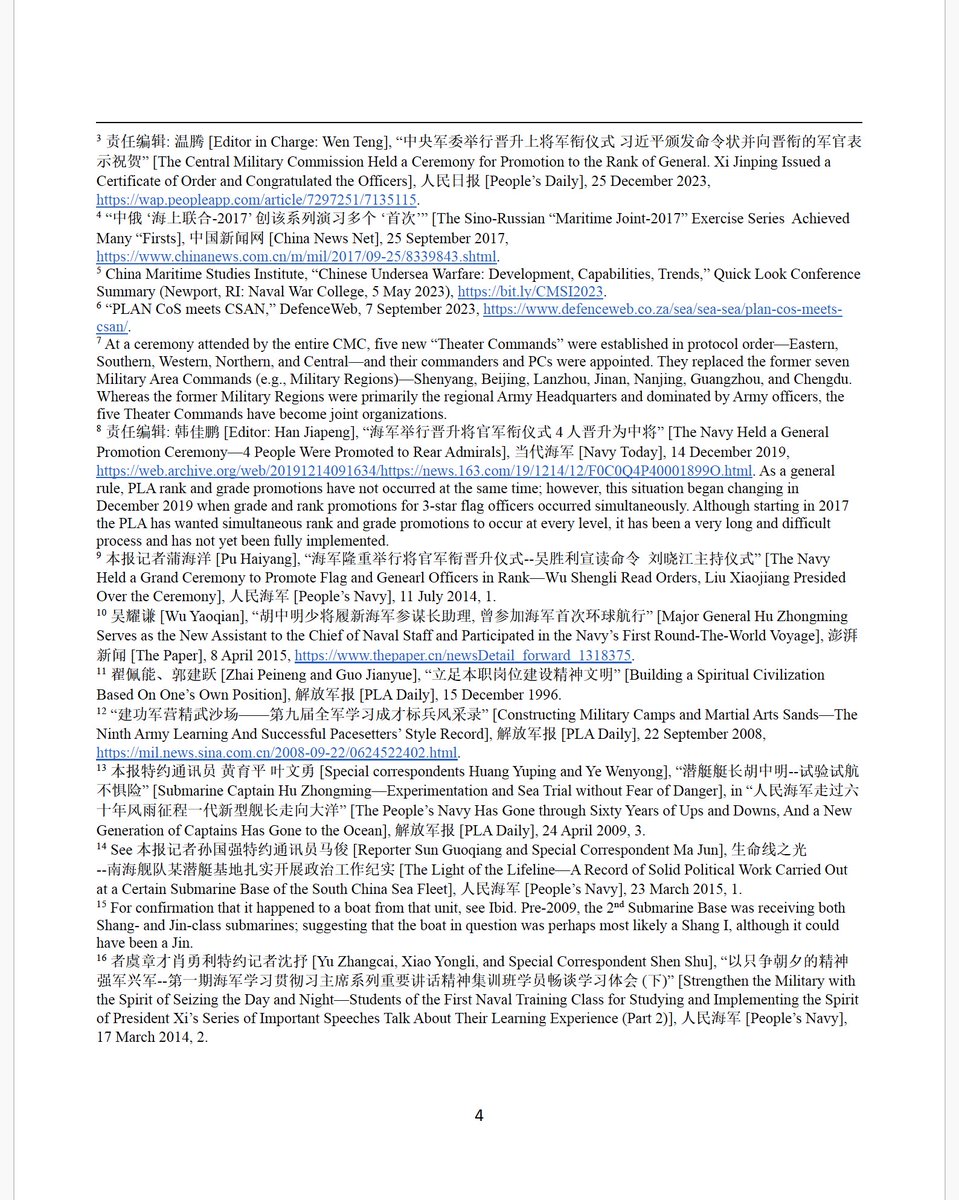Now Out in Paperback! “#China Goes to #Sea: #Maritime Transformation in Comparative Historical Perspective”
amazon.com/China-Goes-Sea…
@NavalWarCollege @ChinaMaritime is proud to publish this new version w/ @NavalInstitute @USNIBooks!
Come for the #maps, stay for the #history...
amazon.com/China-Goes-Sea…
@NavalWarCollege @ChinaMaritime is proud to publish this new version w/ @NavalInstitute @USNIBooks!
Come for the #maps, stay for the #history...
Honored to have #JonathanSpence’s endorsement:
“The maritime #history of #China has long been a neglected field..China Goes to Sea bring[s] that knowledge-gap to an end..will be an indispensable companion to those readers seeking to understand where China’s navy may be heading.”
“The maritime #history of #China has long been a neglected field..China Goes to Sea bring[s] that knowledge-gap to an end..will be an indispensable companion to those readers seeking to understand where China’s navy may be heading.”
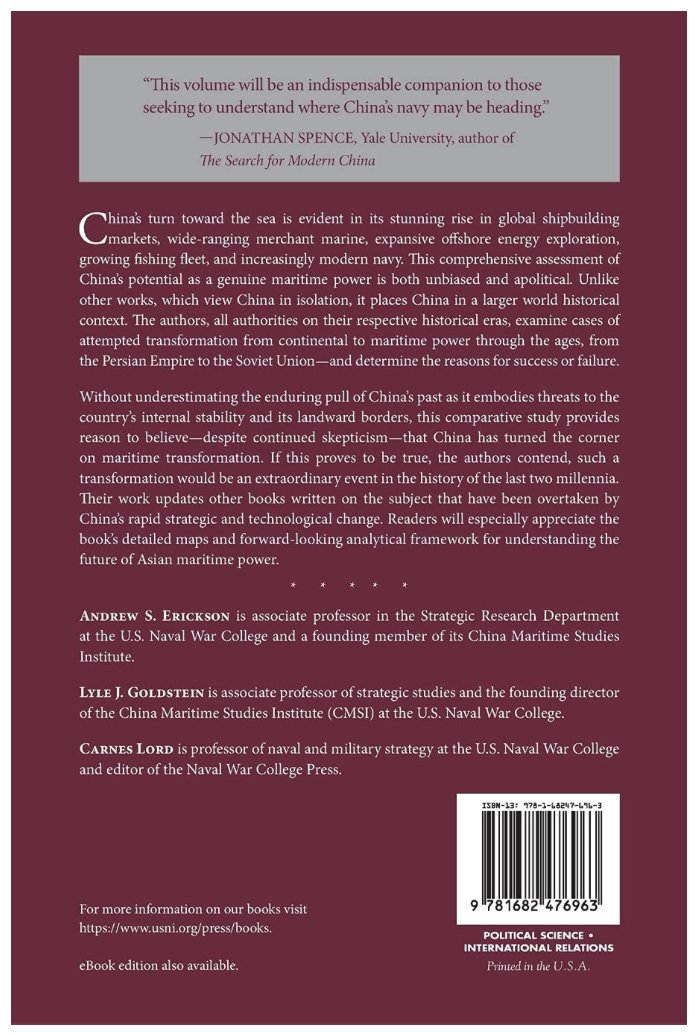
As European #naval powers & even the @USNavy struggle with ship numbers, #China has gone to #sea.
Represents the reversal of a great historical trend that began 600 years ago, when China withdrew from the seas & European naval expansion spread Western influence around the globe.



Represents the reversal of a great historical trend that began 600 years ago, when China withdrew from the seas & European naval expansion spread Western influence around the globe.

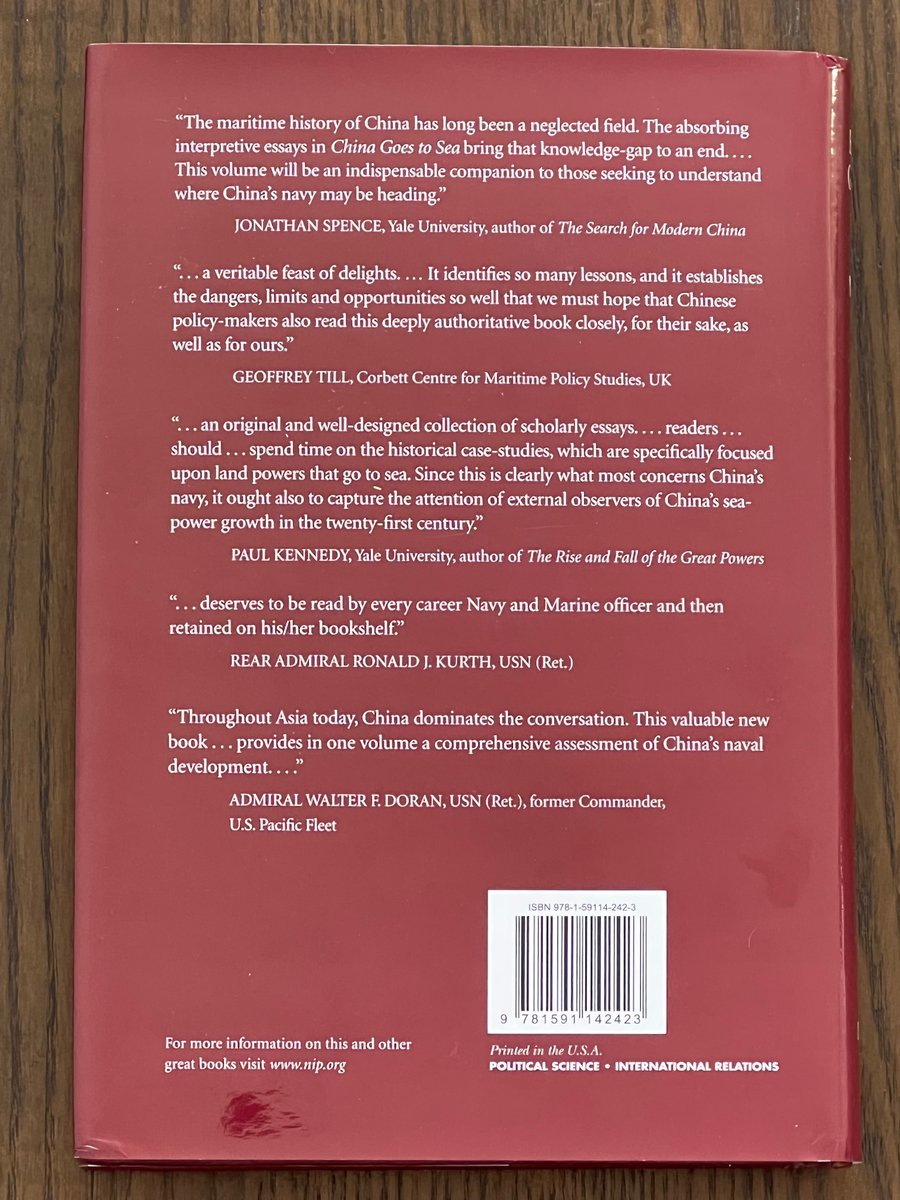

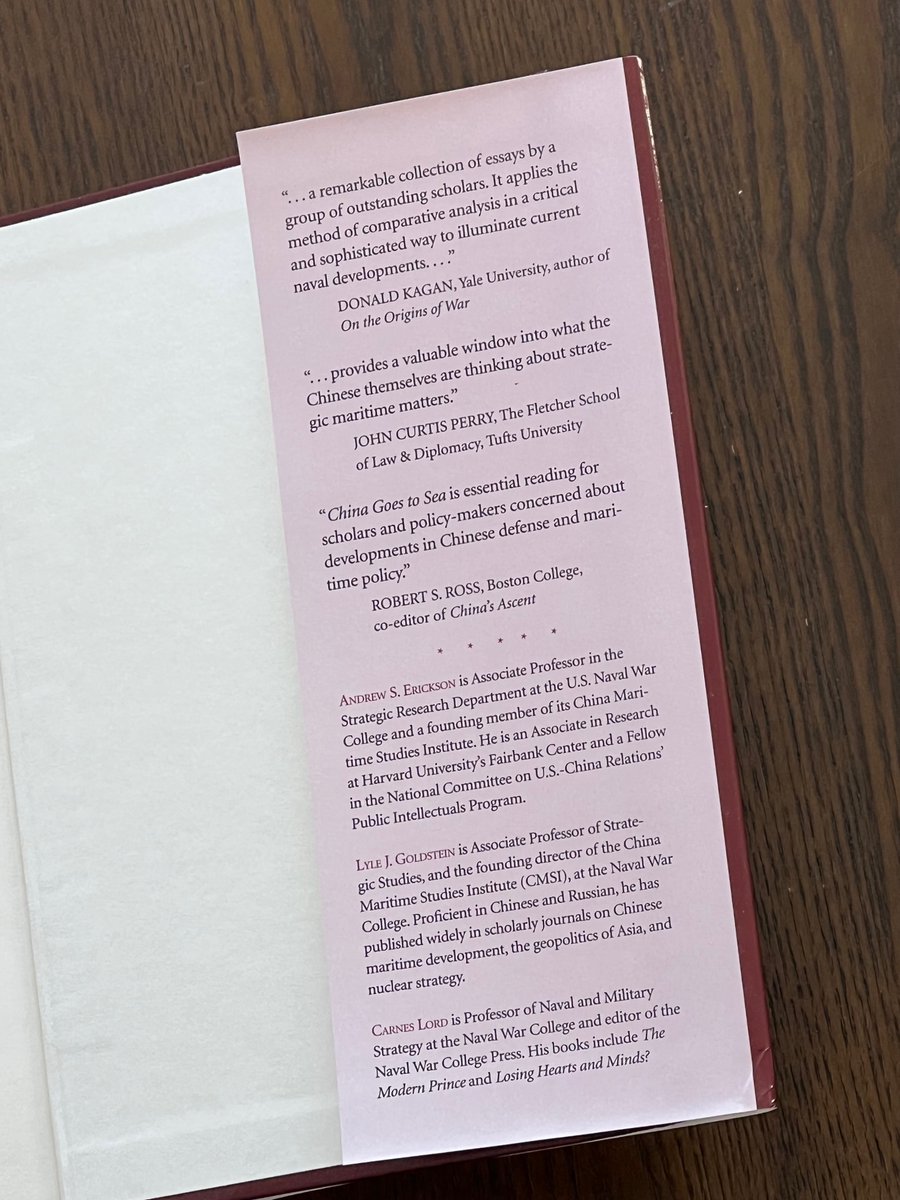
For the first time in #Chinese #history, #China’s status & identity as a maritime (vs. continental) power is a robust, enduring question—
to what extent will China’s persisting political & strategic geography & the continentalist strategic culture it helped form shape it at sea?
to what extent will China’s persisting political & strategic geography & the continentalist strategic culture it helped form shape it at sea?

We probe several cases of attempted transformation in the ancient world that may elucidate #China’s #maritime prospects.
Together with #Roman Empire, the #Persian Empire is the most successful example we examined.
New ideas, incentives, & scale yielded first substantial #navy.
Together with #Roman Empire, the #Persian Empire is the most successful example we examined.
New ideas, incentives, & scale yielded first substantial #navy.

#Sparta offers one of the most dramatic examples of fast #maritime transformation failure.
An austere, inward-looking, arrogant, conservative, continental power, its feudal agricultural system did not produce significant surplus.
Regime survival shackled its people & #strategy.

An austere, inward-looking, arrogant, conservative, continental power, its feudal agricultural system did not produce significant surplus.
Regime survival shackled its people & #strategy.
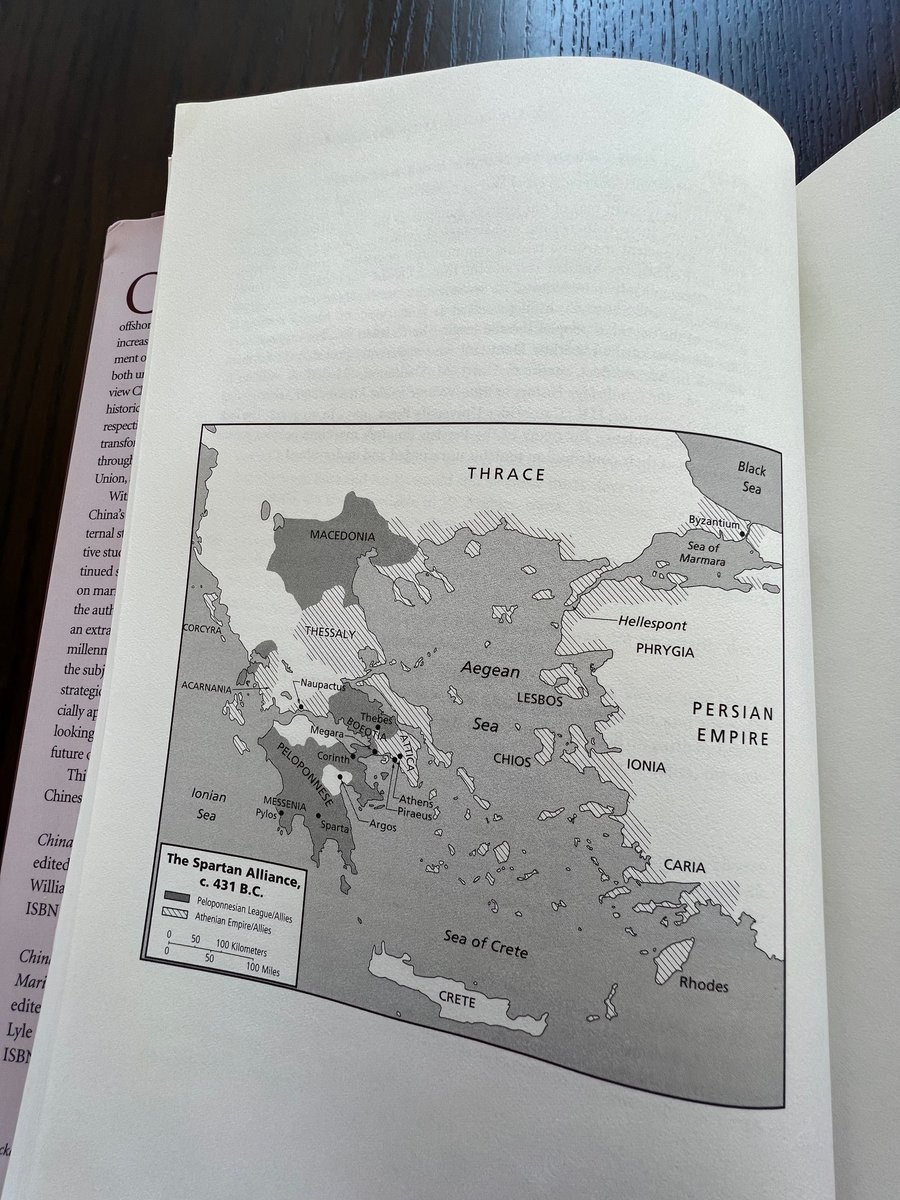
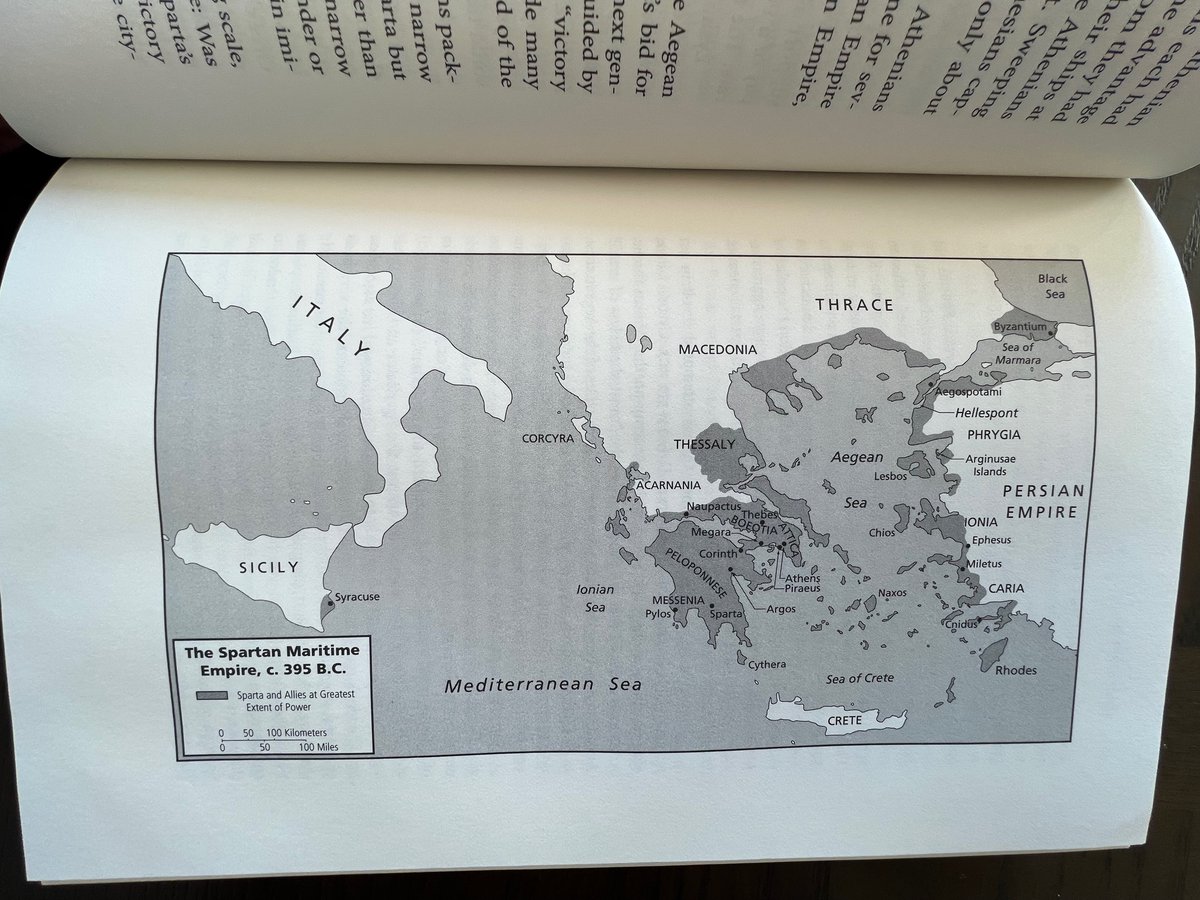
#Rome became the uncontested #SeaPower of its age, turning #Mediterranean into “#Roman lake” for 4 centuries.
During #PaxRomana, #maritime commerce flourished throughout Med—the ancient equivalent of an era of globalization under protection of a great power naval policing force.
During #PaxRomana, #maritime commerce flourished throughout Med—the ancient equivalent of an era of globalization under protection of a great power naval policing force.

The #Ottoman Empire had significant resources but also what proved to be insuperable continentalist limitations.
Land frontiers diverted attention & resources.
Ottomans were thus unable to keep up w/ economic globalization & forfeited their chance to dominate 1st global market.
Land frontiers diverted attention & resources.
Ottomans were thus unable to keep up w/ economic globalization & forfeited their chance to dominate 1st global market.

As the center of #naval competition moved into the Atlantic & beyond during the modern era, several of the major continental powers made earnest attempts at #maritime transformation—with limited success.
Imperial #France made 4 major attempts, & failed each time to sustain them.
Imperial #France made 4 major attempts, & failed each time to sustain them.

Today, #France is a leading #naval & #IndoPacific power—important actor, valued ally/partner.
But Imperial France never sustained status as world's #1 #SeaPower.
Continentalist constraints preventing this—& their periodic but unsustainable overcoming—are instructive for #China.
But Imperial France never sustained status as world's #1 #SeaPower.
Continentalist constraints preventing this—& their periodic but unsustainable overcoming—are instructive for #China.

Imperial #Russia—like its successor states—suffered terrible #geographic challenges.
Vast/dispersed #land vulnerabilities, cold/ice, restricted #sea access/chokepoints.
Unique example of #PeterTheGreat—but this level of navalist-oriented leadership was unmatched subsequently...
Vast/dispersed #land vulnerabilities, cold/ice, restricted #sea access/chokepoints.
Unique example of #PeterTheGreat—but this level of navalist-oriented leadership was unmatched subsequently...

Like Imperial Russia, Imperial #Germany faced grave geographic challenges.
Unlike Russia, Germany overextended itself by attempting to use #naval transformation to obviate—not complement—land power.
In the end, #Navy simply couldn’t compensate for 2-front continental challenge.
Unlike Russia, Germany overextended itself by attempting to use #naval transformation to obviate—not complement—land power.
In the end, #Navy simply couldn’t compensate for 2-front continental challenge.

Imp. #German case has some parallels to #China—& 1 big difference.
Ancient sea traditions, geopolitical latecomers, used econ/tech/edu to assist #maritime trans, govt-led industrialization supported by mar. econ.
But so far, China hasn't precipitated disastrous great power war.
Ancient sea traditions, geopolitical latecomers, used econ/tech/edu to assist #maritime trans, govt-led industrialization supported by mar. econ.
But so far, China hasn't precipitated disastrous great power war.

Overall, #Soviet leaders were unfavorable to the #navy, especially after #nuclear weapons' emergence questioned large surface combatants' utility.
Even during its high tide under #Gorshkov in the 1970s, the navy lagged the ground & #missile forces in the #military establishment.
Even during its high tide under #Gorshkov in the 1970s, the navy lagged the ground & #missile forces in the #military establishment.

Now for the #China cases!
Historians have exaggerated #Chinese neglect of the #sea.
In the 1300s, Chinese made cutting-edge innovations in shipbuilding & naval armaments, & invented the magnetic compass.
The #Ming Dynasty had a strong naval element from start to finish. (#map)
Historians have exaggerated #Chinese neglect of the #sea.
In the 1300s, Chinese made cutting-edge innovations in shipbuilding & naval armaments, & invented the magnetic compass.
The #Ming Dynasty had a strong naval element from start to finish. (#map)

#ZhengHe's 7 voyages (1405–33) were #Ming #maritime high tide.
Nurtured trade, (re)opened relations w/ tributary kingdoms, demonstrated hard/soft power & brought Ming flag across #IndianOcean to P.Gulf + E.Africa.
Emperor #Yongle's death ended costly sponsorship.
Nurtured trade, (re)opened relations w/ tributary kingdoms, demonstrated hard/soft power & brought Ming flag across #IndianOcean to P.Gulf + E.Africa.
Emperor #Yongle's death ended costly sponsorship.

In 1500s harsh—albeit unevenly enforced—Imperial Edicts discouraged long-distance #maritime commerce.
#Ming #China lost lead in #nautical #technology.
"Prohibitions" drove #Chinese/foreign merchants into coastal #piracy, which flourished during #Wokou Raids of 1540s–80s. (#map)
#Ming #China lost lead in #nautical #technology.
"Prohibitions" drove #Chinese/foreign merchants into coastal #piracy, which flourished during #Wokou Raids of 1540s–80s. (#map)
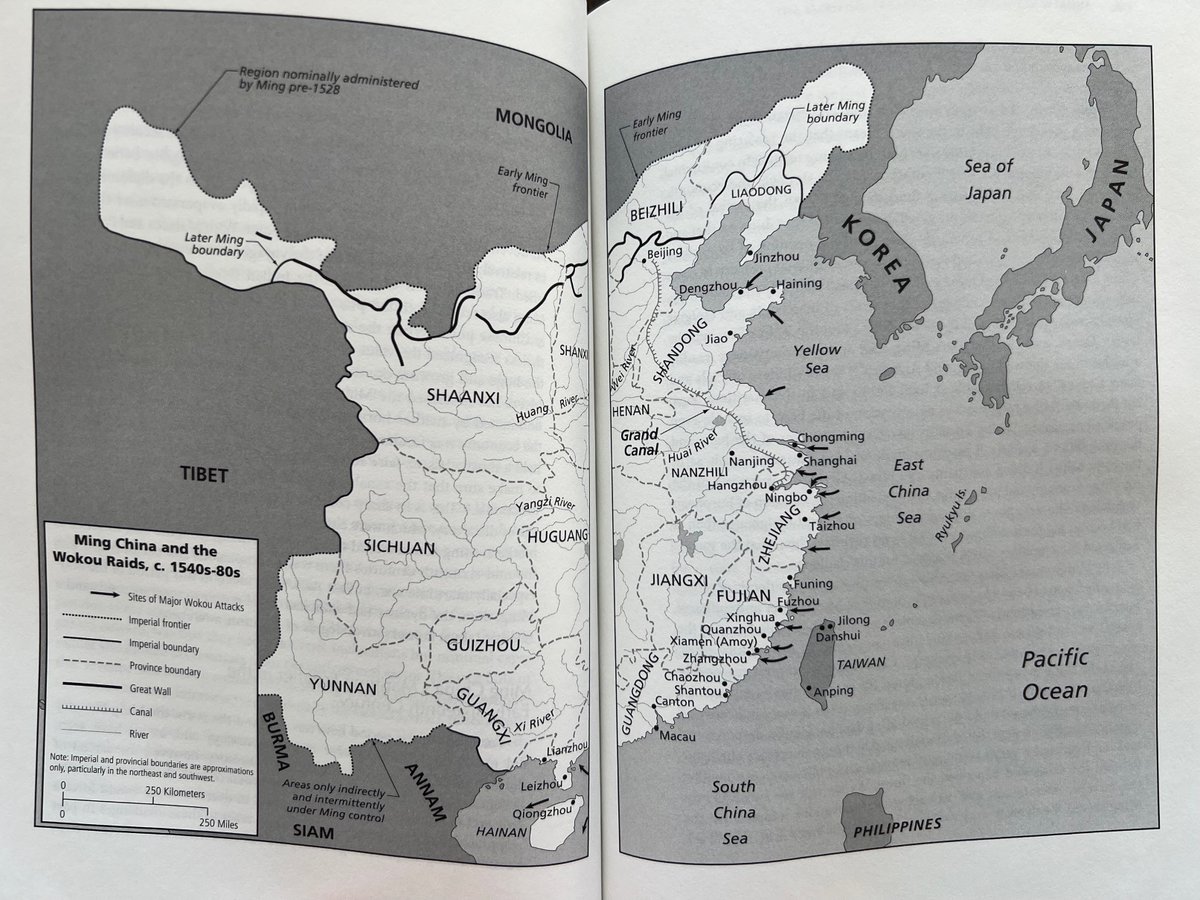
#Qing #China first focused on stabilizing its North/West land frontiers.
Initially conquered vast new territories on Inner Asian periphery.
Generals Li & Zuo debated the geostrategic prioritization of #land vs #sea power.
Qing chose land power. Li & China suffered the results.
Initially conquered vast new territories on Inner Asian periphery.
Generals Li & Zuo debated the geostrategic prioritization of #land vs #sea power.
Qing chose land power. Li & China suffered the results.
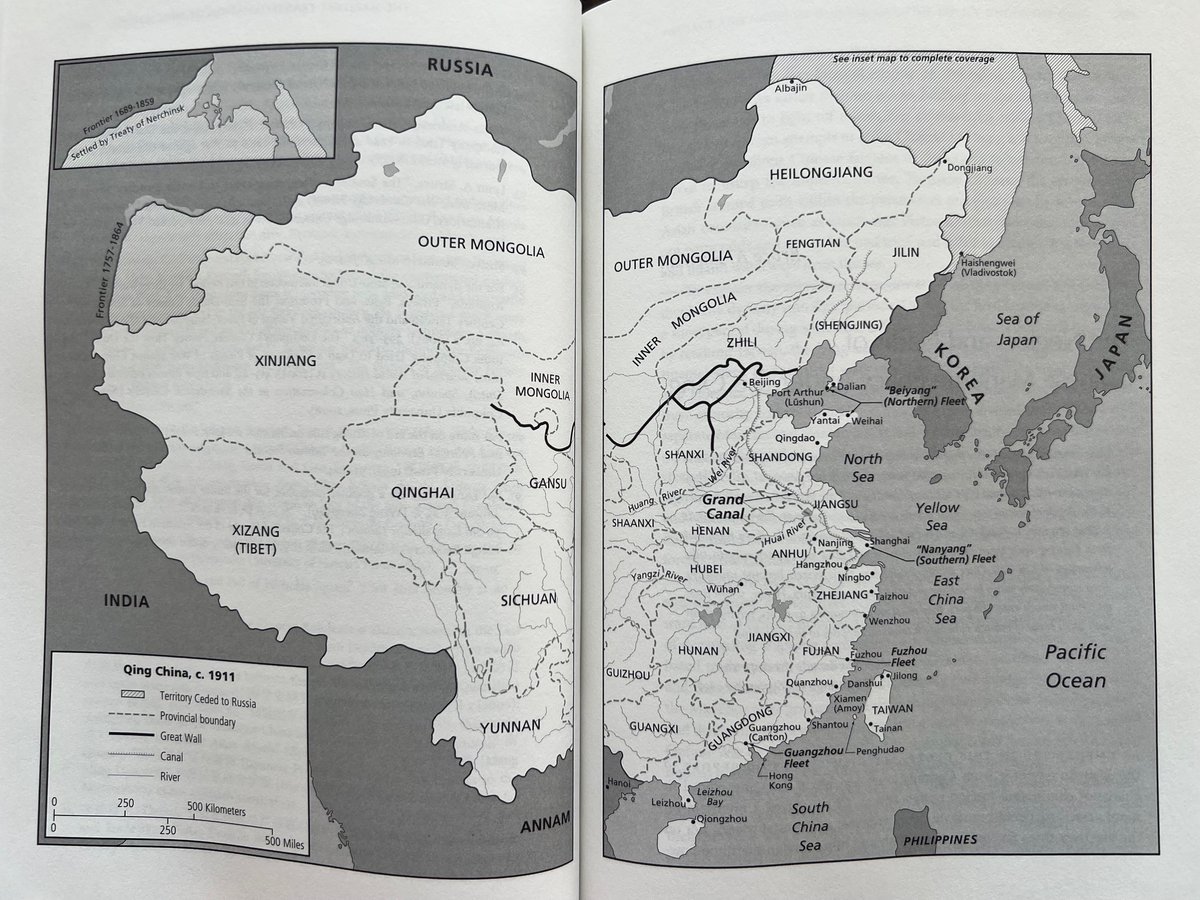
Beyond internal political problems, #Qing #China suffered severely from rising British, French & Japanese #naval power.
Proved incapable of resisting Western pwrs' modern navies. (#map)
Ceded #HongKong after Britain penetrated heart of China's riverine network in 1st #OpiumWar.
Proved incapable of resisting Western pwrs' modern navies. (#map)
Ceded #HongKong after Britain penetrated heart of China's riverine network in 1st #OpiumWar.

#Qing #China eventually purchased #ships from abroad—but lacked reliable infrastructure & professional #navy to operate them effectively in battle.
Disastrous results. Suffered costly defeat in 1894–95 Sino-Japanese War. (#map)
Qing fell in 1911—then years of chaos & Civil War.
Disastrous results. Suffered costly defeat in 1894–95 Sino-Japanese War. (#map)
Qing fell in 1911—then years of chaos & Civil War.

During #ColdWar, #China’s #naval development was constrained—first by US dominance of #maritime #EastAsia & later by internal policy debacles & deterioration of relations with the USSR.
#PLA #Navy primarily supported ground forces.
Did not even have its own strategy until 1985.

#PLA #Navy primarily supported ground forces.
Did not even have its own strategy until 1985.

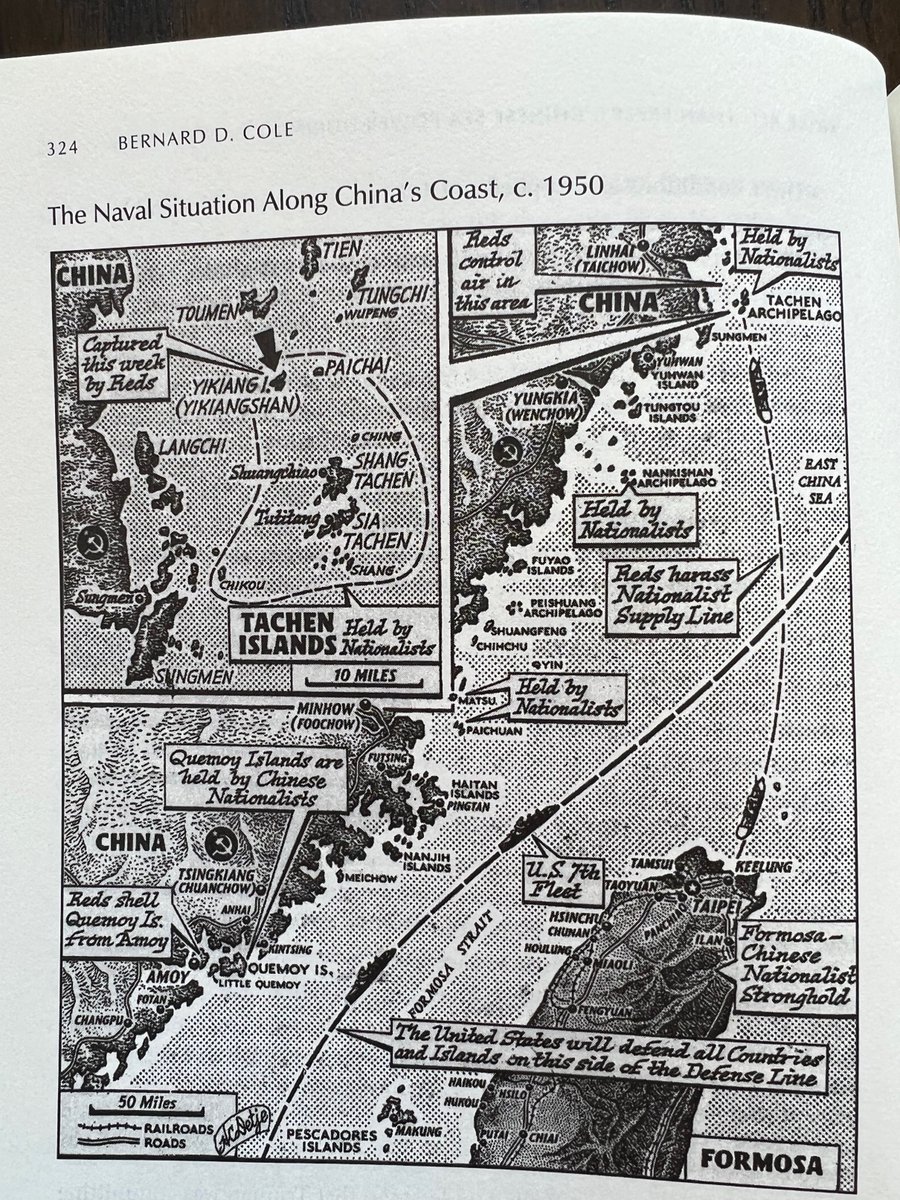
China has overcome historical obstacles to achieve what may finally be enduring maritime development.
Dynamic commercial maritime sector & #CivMil #shipbuilding synergy offers a strong basis for transformation typically lacking in land powers that earlier attempted to go to sea.



Dynamic commercial maritime sector & #CivMil #shipbuilding synergy offers a strong basis for transformation typically lacking in land powers that earlier attempted to go to sea.
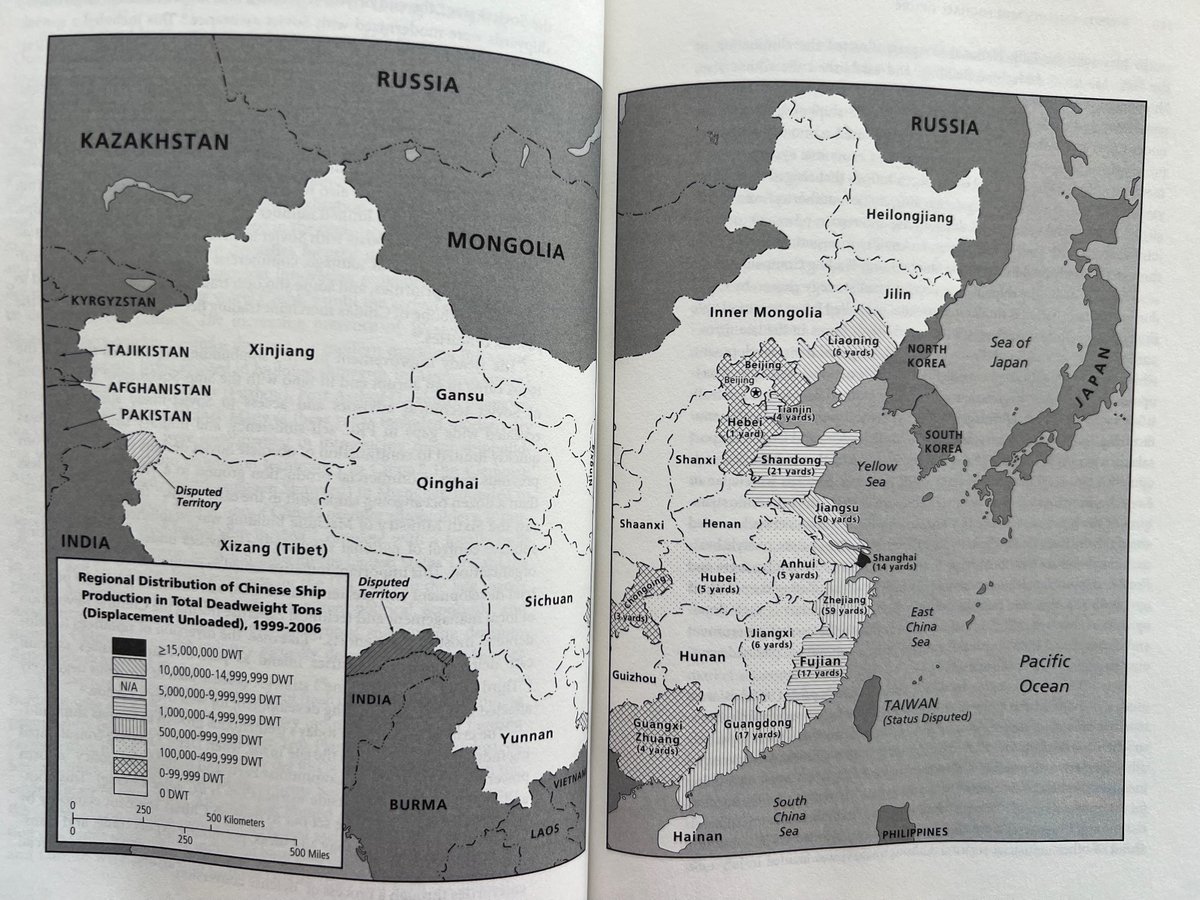
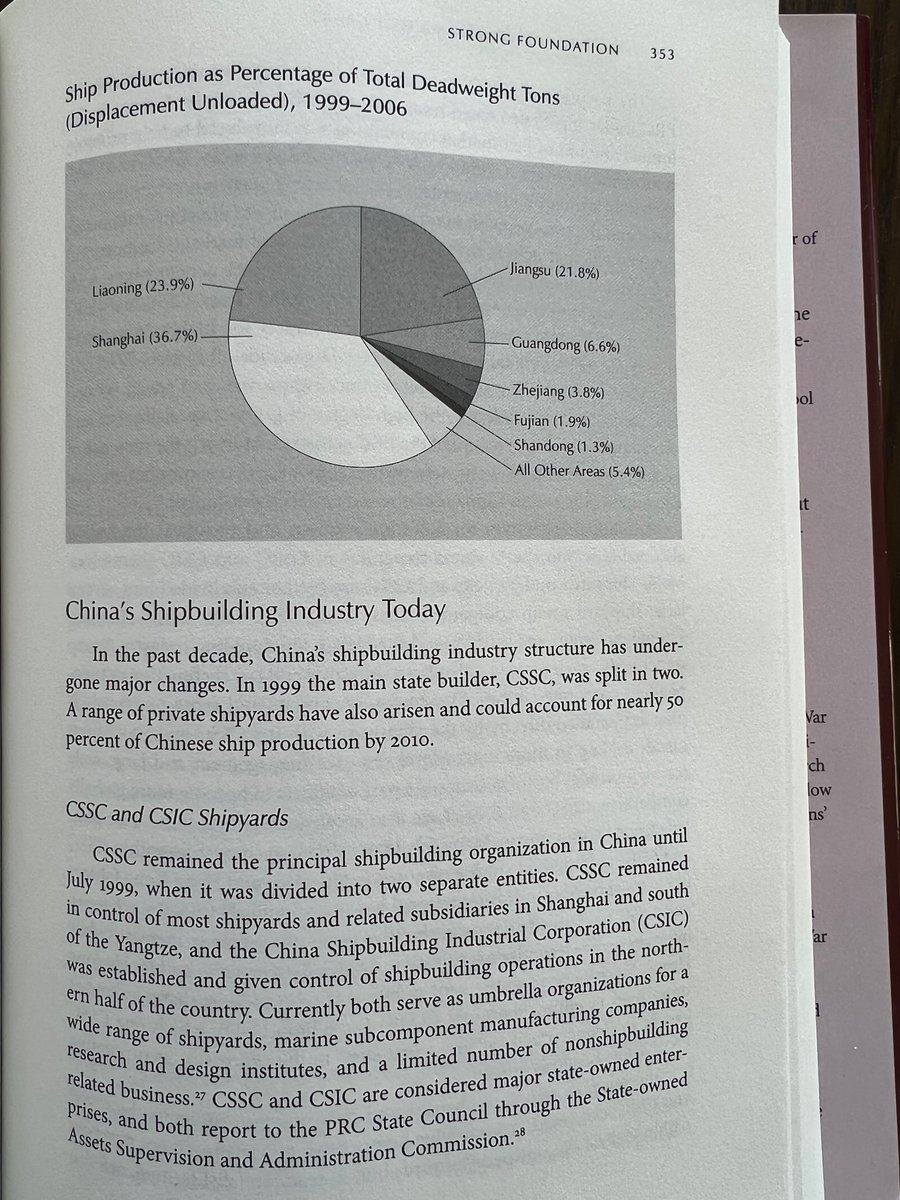
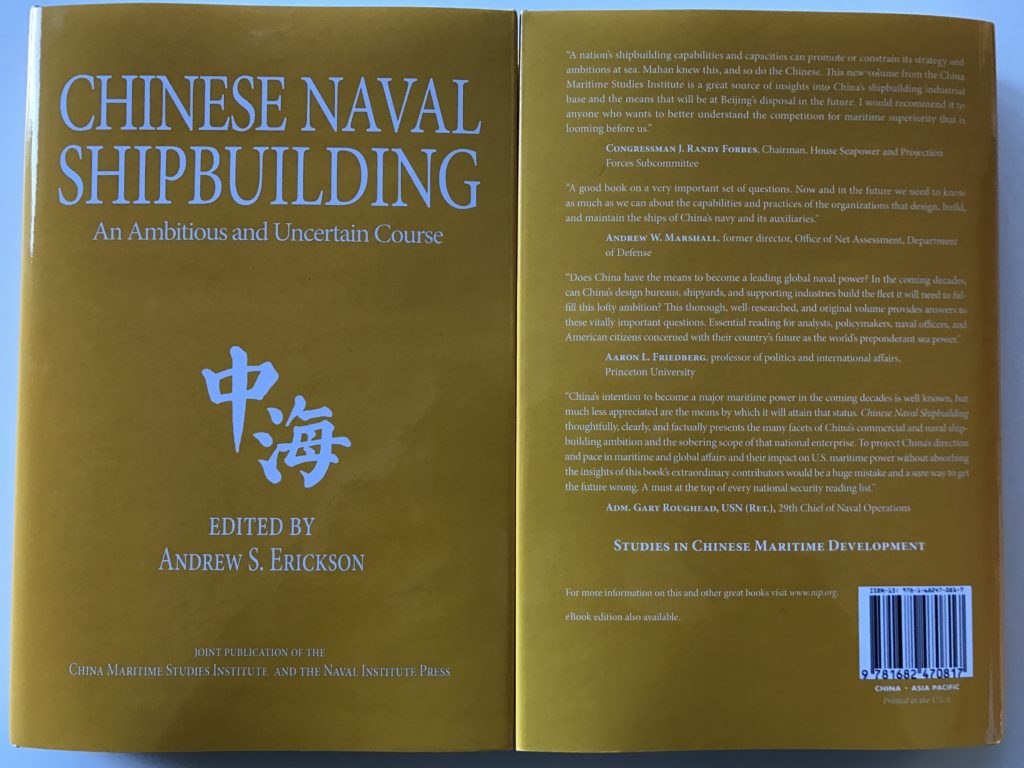

#PRC/#CCTV #大国崛起 9-#GreatPower #history emphasizes importance of internal unity, market mechanisms, related ideological/scientific/institutional innovation, & int'l peace.
Suggests power stems from economic dev't fueled by foreign trade—itself underwritten by a strong #navy.

Suggests power stems from economic dev't fueled by foreign trade—itself underwritten by a strong #navy.
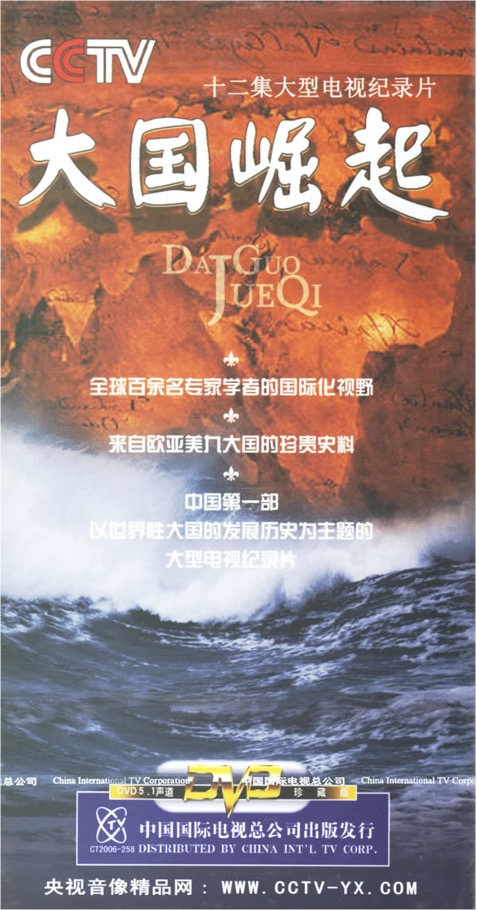

What are #history's lessons from continental/land powers attempting #maritime transformation?
And what are #China's own trajectory & prospects in this regard?
Some concluding thoughts from #China Goes to #Sea...
amazon.com/China-Goes-Sea…
@NavalInstitute @USNIBooks @j_grygiel
And what are #China's own trajectory & prospects in this regard?
Some concluding thoughts from #China Goes to #Sea...
amazon.com/China-Goes-Sea…
@NavalInstitute @USNIBooks @j_grygiel
1) Even amid tech advances, #geography matters. Land powers generally disadvantaged.
#China engineered rare improvements—#GreatWall, #GrandCanal, major dams/pipelines + #SouthChinaSea outposts.
But can't fix #IslandChains/# of neighbors.
Also——instability/border/dispute risks.

#China engineered rare improvements—#GreatWall, #GrandCanal, major dams/pipelines + #SouthChinaSea outposts.
But can't fix #IslandChains/# of neighbors.
Also——instability/border/dispute risks.


2) #Maritime transformation is a difficult, treacherous, often destabilizing process that no modern land power has fully accomplished.
Only 2 enduring successes in history: #Persia & #Rome!
Even they retained continental characteristics—joint maritime ops supported armies, etc.

Only 2 enduring successes in history: #Persia & #Rome!
Even they retained continental characteristics—joint maritime ops supported armies, etc.


3) #Economics!
Unlike #USSR/earlier land powers, #China has truly comprehensive national power, with a strong commercial component.
Economical approach—until recently.
Will current buildup trigger unanticipated foreign backlash, & future maintenance crowd competing priorities?
Unlike #USSR/earlier land powers, #China has truly comprehensive national power, with a strong commercial component.
Economical approach—until recently.
Will current buildup trigger unanticipated foreign backlash, & future maintenance crowd competing priorities?

4) State's strategic outlook—shaped by leader's domestic (e.g., regime survival) & international considerations.
Hard to balance/prioritize strategic objectives when they pose multiple/conflicting challenges.
#Beijing weighs internal stability vs. great power status & security.



Hard to balance/prioritize strategic objectives when they pose multiple/conflicting challenges.
#Beijing weighs internal stability vs. great power status & security.




5) #Leadership—most critical factor for #maritime transformation.
Enabled #ZhengHe, frustrated Qing reformers.
Most favorable leader/society support for strong seaward focus & advance than at any time in #China's long #history.
But ongoing potential for countervailing factors.



Enabled #ZhengHe, frustrated Qing reformers.
Most favorable leader/society support for strong seaward focus & advance than at any time in #China's long #history.
But ongoing potential for countervailing factors.


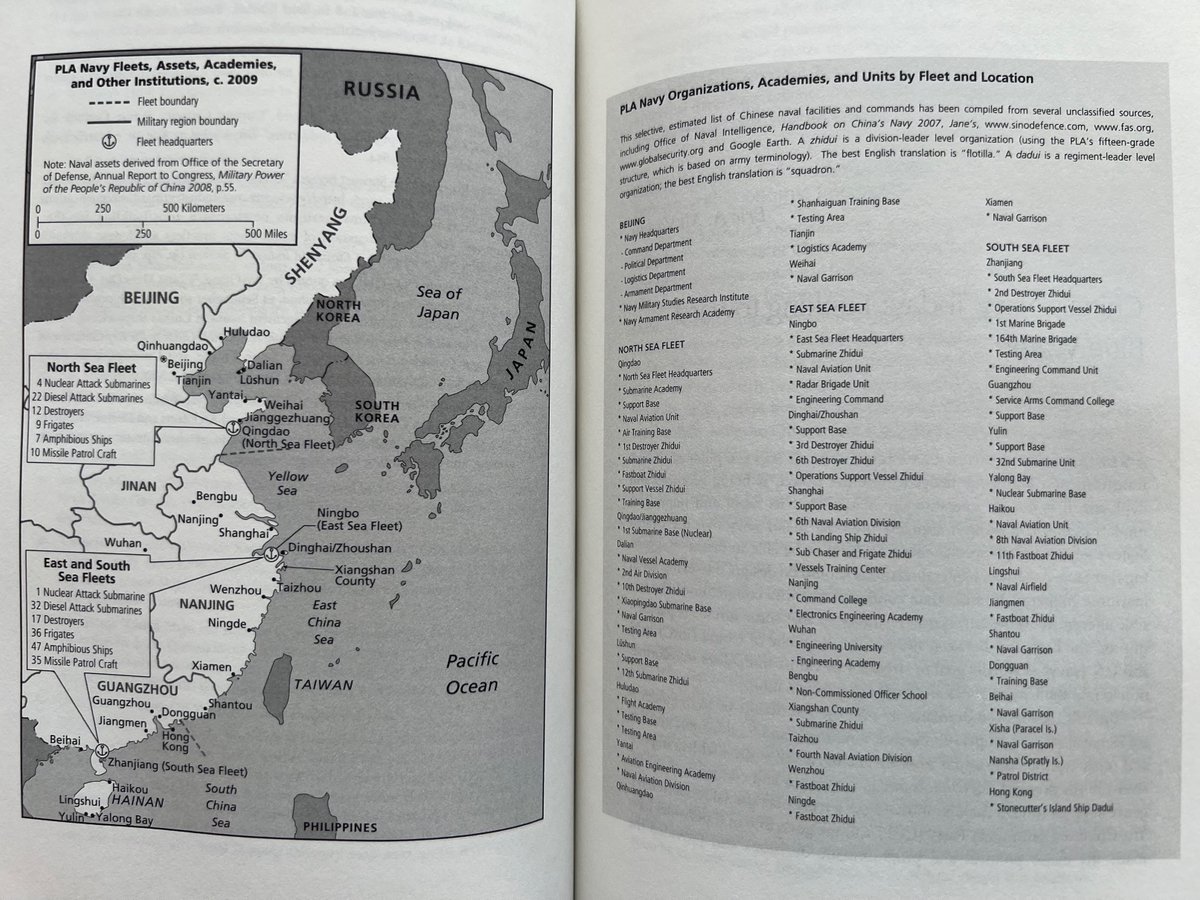
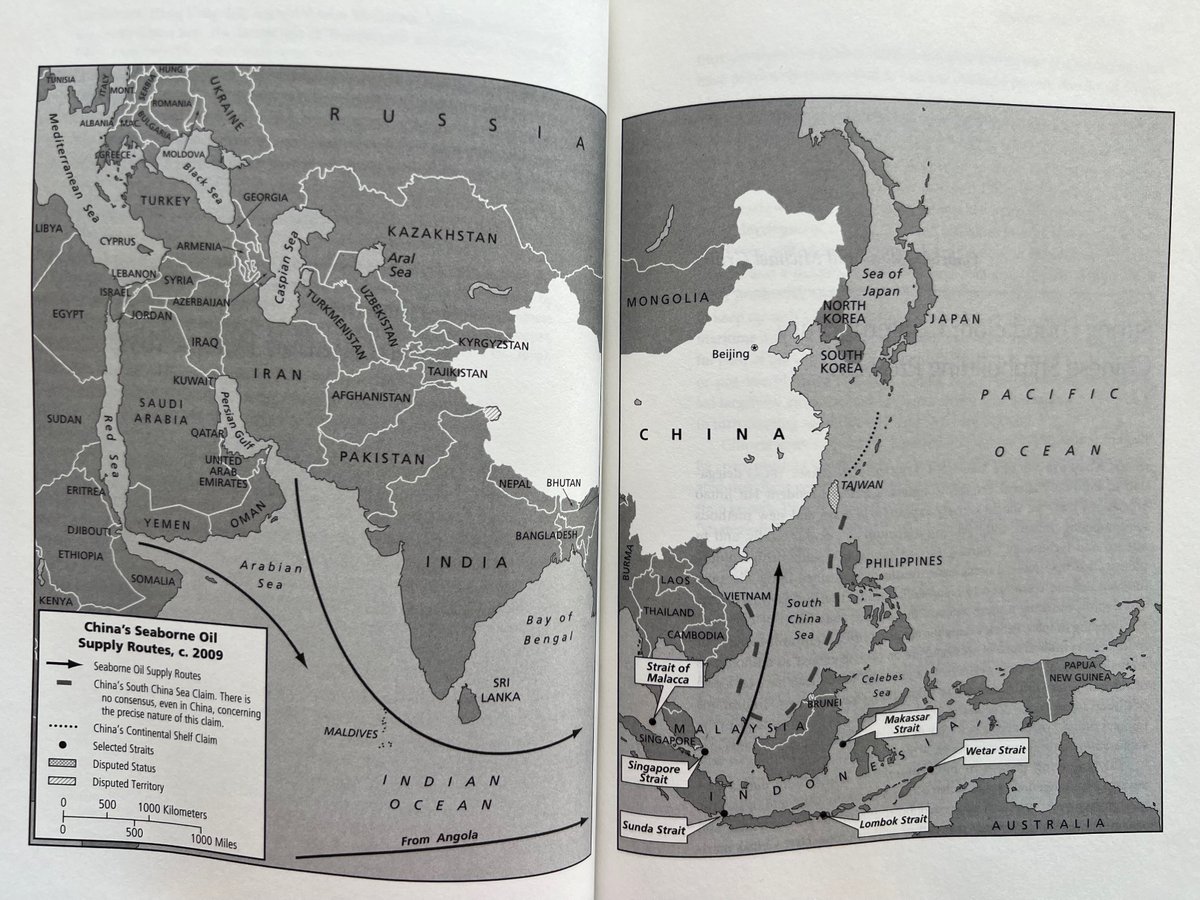
6) Naval strategy & operational art—continental powers typically can't match #maritime powers; use different approach.
#PRC #naval #warfare may look very different from @USNavy's, yet offer potent options for #China's own situation/goals.
#Missile-centric approach, esp. #ASBMs!
#PRC #naval #warfare may look very different from @USNavy's, yet offer potent options for #China's own situation/goals.
#Missile-centric approach, esp. #ASBMs!

The experience of land powers that have previously attempted to become #sea powers has generally been negative.
Exceptions: Persia & Rome
#China is thus sailing into a strategic headwind.
The extent to which #PRC should attempt such a transformation has been & will be debated.



Exceptions: Persia & Rome
#China is thus sailing into a strategic headwind.
The extent to which #PRC should attempt such a transformation has been & will be debated.


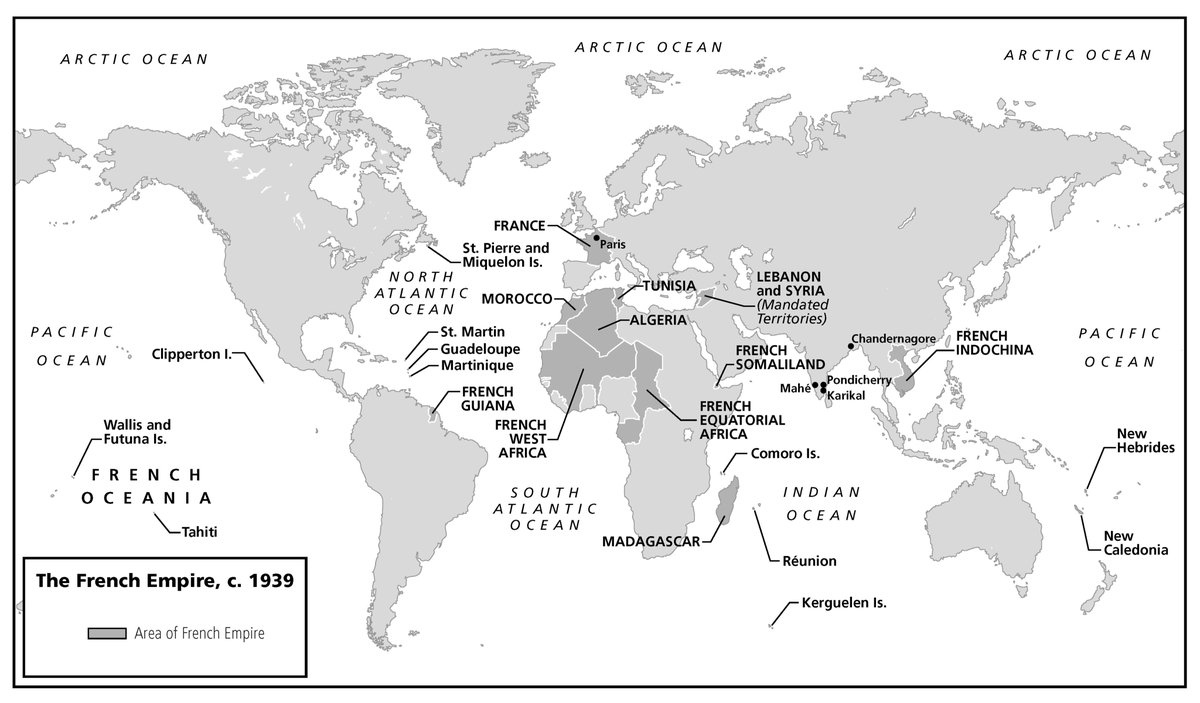

#China enjoys advantages that its predecessors have generally lacked:
1) Robust maritime economy
2) Dynamic shipbuilding industry
3) Settled borders w/ nearly all land neighbors
4) Leadership that supports maritime development as natural phenomenon—doesn't "decree" unduly [...?]



1) Robust maritime economy
2) Dynamic shipbuilding industry
3) Settled borders w/ nearly all land neighbors
4) Leadership that supports maritime development as natural phenomenon—doesn't "decree" unduly [...?]



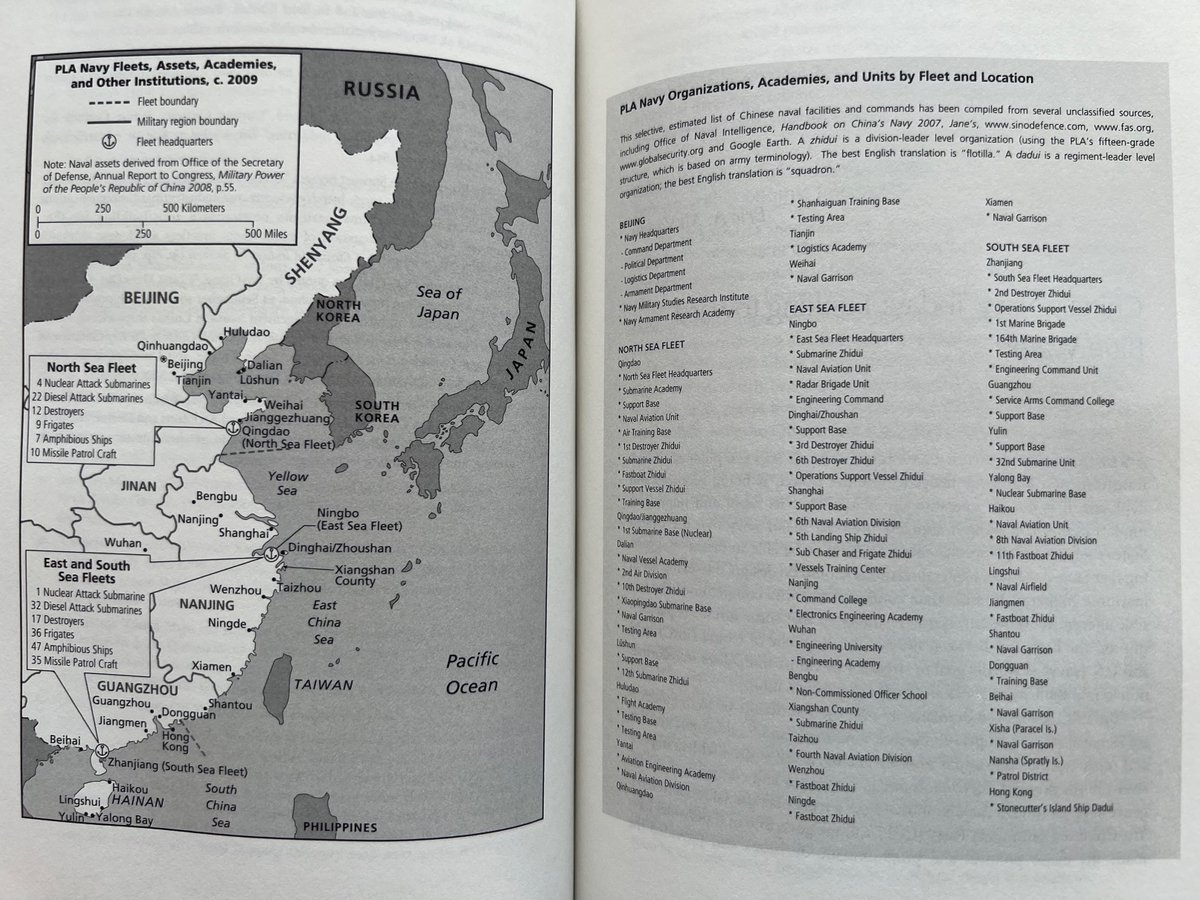
In conclusion:
#China has very likely turned the corner on a genuine #maritime transformation.
Such an achievement would be a remarkable—if not singular—event in the #history of the last two millennia.
#Read more here:
andrewerickson.com/2022/01/now-ou…
amazon.com/China-Goes-Sea…
#THREAD
#China has very likely turned the corner on a genuine #maritime transformation.
Such an achievement would be a remarkable—if not singular—event in the #history of the last two millennia.
#Read more here:
andrewerickson.com/2022/01/now-ou…
amazon.com/China-Goes-Sea…
#THREAD
@threadreaderapp please unroll
• • •
Missing some Tweet in this thread? You can try to
force a refresh


